Category: Uncategorized
November 27th, 2016 by geoffhodgson1946
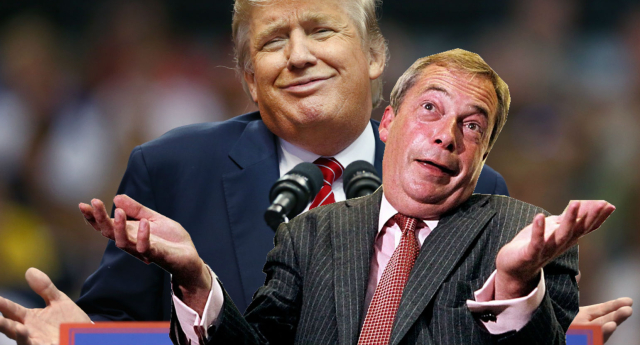
Geoffrey M. Hodgson
What lay behind the Brexit vote and the election of Donald Trump? In my previous blog I noted those who blamed “globalisation” or “neoliberalism”. There are some grains of truth in their arguments. But, intentionally or otherwise, they fall into a Marxist trap of seeing the growth of markets and the logic of global capitalism as somehow to blame.
This gives the far-leftists the nudge: overthrow capitalism and the problems will be solved. That, of course, is baloney.
A major problem with putting the blame on “neoliberalism” (understood as the ideology of free-markets, privatisation and a smaller state) is that its influence dates back to the 1970s, but the intervening years have seen the repeated election successes of non-bigoted centre-left politicians such as Tony Blair and Barack Obama. Although Blair and Bill Clinton promoted some financial deregulation, they supported more state intervention in other spheres.
As Rajesh Venugopal and Colin Talbot have persuasively elaborated, there is an extreme ambiguity in the term “neoliberalism”.
Blaming “the forces of globalisation” faces similar problems of timing. The modern growth of markets and global finance accelerated after China began reform in 1978 and after the fall of the Berlin Wall in 1989.
The causes of the Brexit vote to leave the European Union on 23 June and of the election of Trump on 8 November 2016 are varied and complex. Here there is scope for many PhD theses and professorial academic tomes. We await this further enlightenment.
I achieve no more than a brief preliminary analysis here. I point to leading factors which may be responsible. These few factors counter the view that “neoliberalism” is the source “of all our problems”. Instead they point to a more immediate and practical agenda to counter racism and nationalist populism.
Who voted for Brexit?
The polling data give us a picture of the social groups who voted for Brexit and for Trump. Let’s take Brexit first. The charts below show that the level of education and income were major factors. The poorer and less-well-educated voted for Brexit.
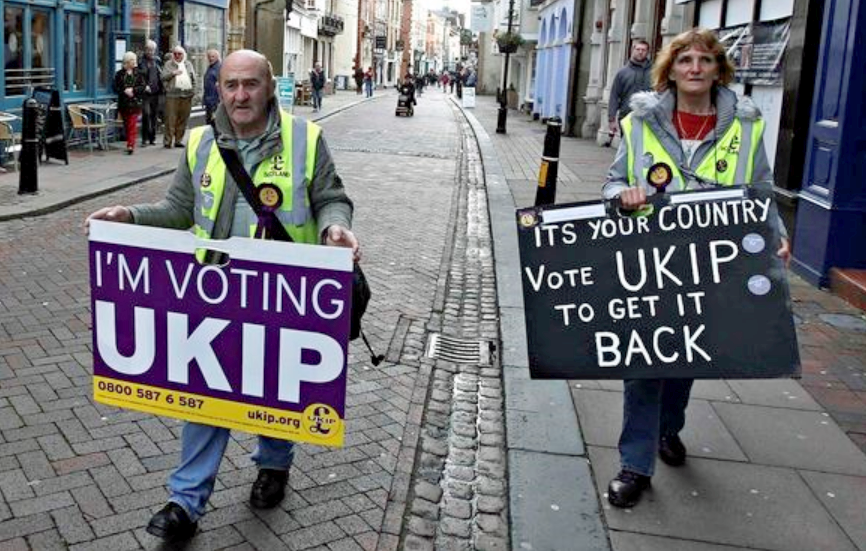
In addition, Brexiteers tended to be older.
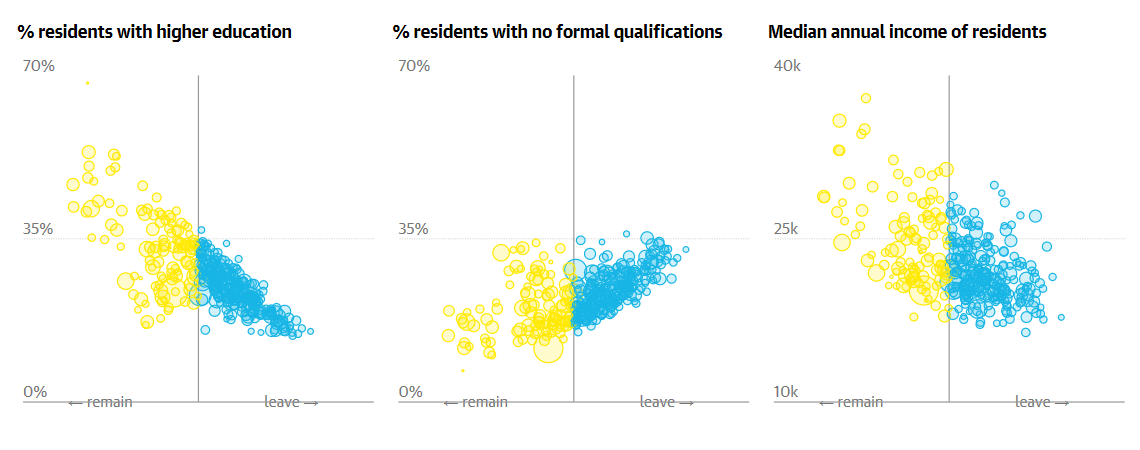
Brexit: key factors by local authority area
Who voted for Trump?
Education levels were also significant in the election of Trump. The charts below show voter preferences in US presidential elections from 1980 to 2016. Comparing the 2016 presidential election with its predecessors, a wide gap in presidential preferences emerged between those with and without a college degree.
Data from the Pew Research Center show that college graduates backed Hillary Clinton by a 9-point margin, while those without a college degree backed Trump 52%-44%. This is by far the widest gap in polls since 1980. Trump’s margin among whites without a college degree is the largest among any candidate in exit polls since 1980. Two-thirds of non-college whites backed Trump, compared with just 28% who supported Clinton. Trump voters were also more likely to be male.
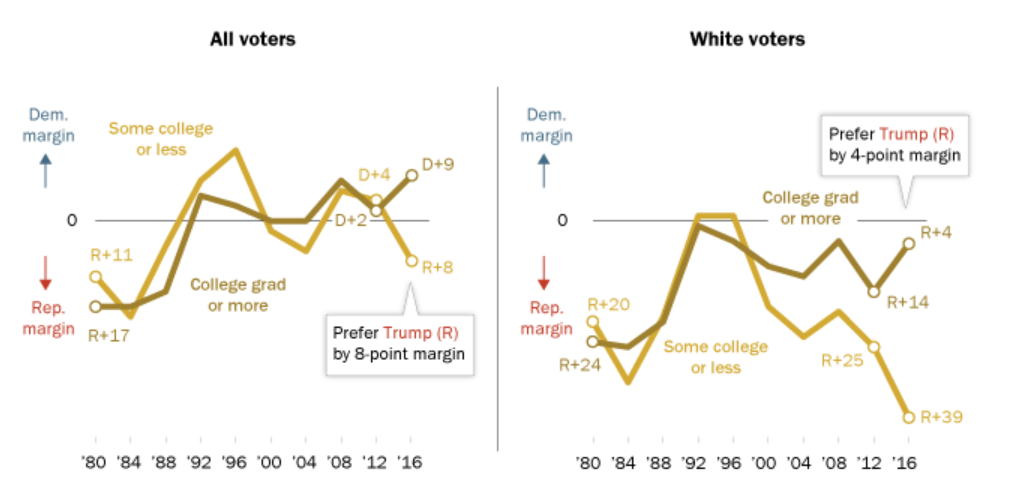
Educational attainment and voter preferences in US presidential elections
But unlike Brexiteers, Trump supporters were more likely to be wealthy. Broken down by income bracket, 52% of voters earning less than $50,000 a year – who make up 36% of the US electorate – voted for Clinton, and 41% for Trump. But among the 64% of US voters who earn more than $50,000 a year, 49% chose Trump, and 47% Clinton.
Consequently, a key common factor behind both Brexit and Trumpageddon is the level of support they achieved among the less well educated. But we then have to explain why levels of education mattered so much more in 2016 than in preceding years.
Economic shocks: recession and austerity
What had changed in the years immediately before 2016 to cause many of the less well educated to vote for Brexit in the UK and Trump in the US? Concerning the US, the chart below carries a very strong message.
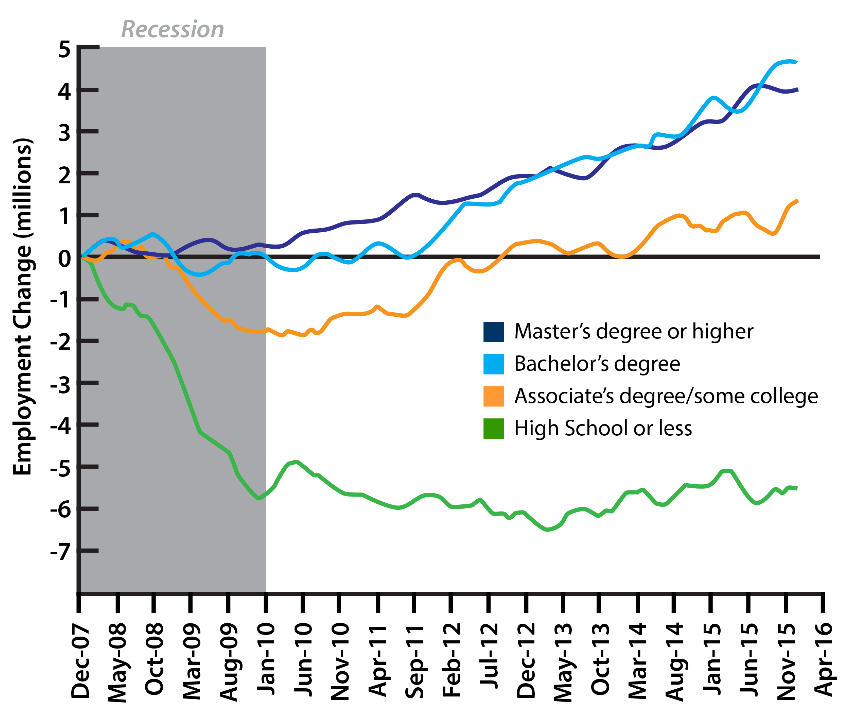
US employment change by educational level, 2007-2016
The above chart shows clearly that job losses from the post-2007 downturn were much greater among those lacking a college education. Most of the blue-collar and service sector jobs that disappeared in 2008 have not returned to the US.
The hit of the recession on jobs for the less well educated in the UK has been less dramatic. But the rending of the fabric of working class society in Britain has been as severe as in the US. Particularly hard-hit have been the formerly industrial areas in the North of England, Wales and Scotland.
Decades of globalisation had already led to big losses of manufacturing jobs in the US and UK. But the economic crash – and the lack of adequate investment in retraining – dramatically exacerbated the problem. Lower-education, low-mobility groups in the population were the most adversely affected.
To add to the recession, in 2010 a Conservative-led government was elected, committed to a drastic programme of cuts in public spending. At the level of local authorities, spending per person fell by 23% in real terms, on average, from 2009 to 2015.
There is some evidence (with important caveats) to suggest that local authorities experiencing more fiscal cuts were more likely to vote in favour of leaving the EU. But it was not a reaction to austerity alone, because in 2015 the austerity-promoting Conservatives won an overall majority in the general election.

It was more to do with how the low-paid workers and welfare dependents reacted to their plight. As Simon Wren-Lewis put it: “when things get tough, people become much more receptive to potential unfairness. It is what helps drive a belief that welfare goes to scroungers”.
This belief gained its strongest support among the least educated. Fed lies and distortions by the likes of Fox News and the Daily Mail, these social strata were the recruiting ground for racist and nationalist populism in the UK and US.
The post-2007 economic shocks were preceded by years of wage stagnation for working people in both countries. One UK analysis showed that over half of working Britain has seen no rise in living standards since 2003. It identified stagnating living standards as an important background to rising dissatisfaction with the economic and political status quo, particularly among poorer households.
In the US, a major stagnation in wage levels dates back to the 1970s. A US survey shows that from 1979 to 2015, low-wage workers’ real wages fell 5%, middle-wage workers’ wages rose only 6%, while those with very high wages saw a 41% increase. (Low wage is 10th percentile, middle wage is 50th percentile, very high wage is 95th percentile.)
“the level of social destruction that has unfolded in the United States over the past few decades is hard to overstate. Whole communities, especially in the small towns and rural areas, have experienced wholesale economic and social collapse, as documented in a diverse array of books … . For the traditional working classes, gone are not only jobs but also the wellsprings of traditional forms of social esteem, replaced with a blighted landscape of deindustrialization, drug addiction, and elite disdain. To be sure, African-Americans have been experiencing this sort of social devastation forever; what is new is whites experiencing the same …”
Against this background of long-term developments and policy failures, a series of economic and social forces have been unleashed in the last decade. It is important to emphasise that Brexit and Trumpageddon cannot be explained by economic factors alone.
Another shock: mass immigration
Despite unceasing inflows, in the US, the number of immigrants as a percentage of the total population declined from 14.7% in 1910 to 4.7% in 1970. Since then the figure has steadily risen, reaching 13.5% in 2015. (Here “immigrants” refers to people residing in the United States who were not U.S. citizens at birth.) Much of this post-1970 increase in US immigration is Hispanic – hence Trump’s demagoguery about “building a wall” between the US and Mexico.
In the UK the annual gross immigration flow has more than tripled from 201,000 in 1982 to 632,000 in 2014. In 33 years the percentage of foreign-born UK residents more than doubled from 6.2% in 1981 to 13.0% in 2014. Much of this immigration has come from former colonies – particularly from Ireland, the Indian subcontinent, Africa and the Caribbean. In more recent years a large number of Eastern Europeans have taken up residence in the UK.
Added to these rising flows, in 2015 and 2016 the world saw pictures of many thousands of Syrians, Iraqis, Afghanis and Africans desperately trying to escape war, poverty and persecution. Many chose Europe as their destination.
sta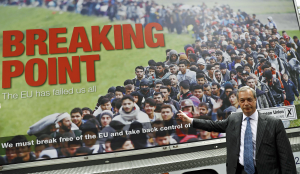
These long-term and short-term conditions – stagnant living standards, cuts in welfare, a dislocated social fabric, and mass immigration – created the conditions for racist bigots and nationalistic populists to garner support.
They were most effective in persuading the least educated. The results were Brexit and Trumpageddon.
Inadequate explanations
The ideology of “neoliberalism” – if that includes austerity and attacks on the welfare state – has played a role in these two events. But, contrary to Naomi Klein and George Monbiot, “neoliberalism” offers a fragment of an adequate explanation of the whole.
Jeremy Corbyn put Trump’s victory down to “the forces of globalisation during the Obama administration”. Indeed, globalisation and deindustrialisation have been hugely disruptive. But Corbyn overlooked the benefits of globalisation, alongside its costs.
Corbyn blamed Barack Obama’s presidency, which started in 2009, but he overlooked the fact that globalisation and deindustrialisation were well under way in the 1970s and 1980s. Corbyn also hinted that “free market, economic thinking” was to blame, portending his statist-socialist disposition toward wholesale public ownership.
Corbyn, Klein and Monbiot are quasi-Marxists who blame the core institutions of capitalism for all problems. They imply some kind of radical alternative to capitalism but they are dreadfully vague on all the details. This combination of sweeping diagnosis and vague remedy is irresponsible leftism at its worst.
Instead we need to focus more concretely on what went wrong, and to develop measures by which as progressive and pragmatic left can put modern capitalist democracies on a different course.
What Corbyn, Klein and Monbiot have so far underestimated is the role of education – or the lack of it – and the impact of mass immigration on fractured and alienated working class communities.
Education and assimilation
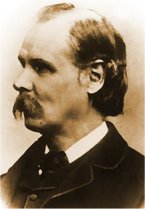
Alfred Marshall
As Alfred Marshall pointed out in his Principles of Economics, machines first replace the most monotonous and muscular labour. Other forms of work, involving adaptive skills and judgment, are less-readily replaceable by machines. There are greater and cheaper possibilities for creating machines to do simple and repetitive work, compared with getting machines to carry out sophisticated, analytical and creative tasks.
Consequently, as I pointed out in my Economics and Utopia and Conceptualizing Capitalism books, a key problem for modern capitalism is to ensure that as many people as possible are educated and trained for the highly skilled and specialist jobs that are generated by rapidly advancing technology and ever-more complex organisation.
If there is a failure to provide adequate education and training for all, then there is a danger of creating an unskilled and socially excluded underclass, eking out an impoverished existence in shanties, trailer parks, or sink housing estates. A major result is increasing economic inequality and festering resentment against those fare better. This massive policy failure has become evident in the UK and US since the 1980s. It has created some of the conditions for Brexit and Trump.
We cannot rely on markets for a solution here. The existence of wage-labour under capitalism means that there cannot be anything approaching a complete futures market for labour. For there to be full futures markets for labour, all workers must enter into contracts for their expected working life. This would be tantamount to voluntary bondage, limiting the freedom of workers to quit their employment. Paradoxically, pushing markets to their limits would mean the return of slavery for the workforce.
As Marshall also pointed out in his Principles, this creates a problem for employers. If the employer spends money on employee training and skill development, then this investment is lost when the worker leaves. As a result, without compensatory arrangements, employers might under-invest in human learning and education.
The state should step in and take the place of these missing markets. Otherwise capitalism produces a permanent skills deficit. In the US and the UK, the responses have been inadequate, leading to an alienated and disillusioned underclass.
Instead of appealing to progressive liberals for policies to deal with their plight, immigrants have provided their scapegoats. Education is vital, but the sources of prejudice have to be tackled as well.
The Left has to talk about immigration. But it is not a numbers game. Immigration can hugely benefit our economy and our culture. The key problem is assimilation, within an overarching system of laws and values that can accommodate diversity, subject to the common observance of basic human liberties and rights.
But that is a topic for another blog.
27 November 2016
Minor edits – 30 November 2016
|
My forthcoming book elaborates on some of the political issues raised in this blog:
Wrong Turnings: How the Left Got Lost
To be published by University of Chicago Press in November 2017
|
Bibliography
Becker, Sascha O. Thiemo Fetzer and Dennis Novy (2016) ‘The fundamental factors behind the Brexit vote’, Vox, 31 October. http://voxeu.org/article/fundamental-factors-behind-brexit-vote.
Elgot, Jessica (2016) ‘Corbyn backs reduction of NATO presence along Russia’s borders’, The Guardian, 13 November. https://www.theguardian.com/politics/2016/nov/13/jeremy-corbyn-hints-at-reducing-nato-presence-russia-putin?CMP=share_btn_tw.
Gilman, Nils (2016) ‘Technoglobalism and its Discontents’, The American Interest, 12 September. http://www.the-american-interest.com/2016/09/12/technoglobalism-and-its-discontents/.
Hodgson, Geoffrey M. (1999) Economics and Utopia: Why the Learning Economy is not the End of History (London and New York: Routledge).
Hodgson, Geoffrey M. (2015) Conceptualizing Capitalism: Institutions, Evolution, Future (Chicago: University of Chicago Press).
Hodgson, Geoffrey M. (2017) Wrong Turnings: How the Left Got Lost (Chicago: University of Chicago Press, forthcoming).
Klein, Naomi (2016) ‘It was the Democrat’s embrace of neoliberalism that won it for Trump’, The Guardian, 9 November. https://www.theguardian.com/commentisfree/2016/nov/09/rise-of-the-davos-class-sealed-americas-fate.
Marshall, Alfred (1920) Principles of Economics: An Introductory Volume (London: Macmillan). [See pages 263 and 565 on skill development.]
Monbiot, George (2016a) ‘Neoliberalism – the ideology at the root of all our problems’, The Guardian, 15 April. https://www.theguardian.com/books/2016/apr/15/neoliberalism-ideology-problem-george-monbiot.
Monbiot, George (2016b) ‘Neoliberalism: the deep story that lies beneath Donald Trump’s triumph’, The Guardian, 14 November. https://www.theguardian.com/commentisfree/2016/nov/14/neoliberalsim-donald-trump-george-monbiot.
O’Hara, Glen (2016) ‘Stop saying that Trumpism is about economics’, 15 November. http://publicpolicypast.blogspot.co.za/2016/11/stop-saying-that-trumpism-is-about.html.
Rodrik, Dani (2011) The Globalization Paradox: Why Global Markets, States, and Democracy Can’t Coexist (Oxford and New York: Oxford University Press).
Talbot, Colin (2016) ‘The myth of neoliberalism’, 31 August. https://colinrtalbot.wordpress.com/2016/08/31/the-myth-of-neoliberalism/.
Venugopal, Rajesh (2015) ‘Neoliberalism as a Concept’, Economy and Society, 44(2), pp. 165-87. http://www.tandfonline.com/doi/abs/10.1080/03085147.2015.1013356.
Posted in Uncategorized
November 18th, 2016 by geoffhodgson1946

Geoffrey M. Hodgson
“One of the most important essays you will read in 2016” @Rokewood
What caused the election of Donald Trump? I am deeply dissatisfied by some of the quick answers to this question.
The leader of Her Majesty’s Opposition had an instant answer. Jeremy Corbyn blamed the left’s association “with the forces of globalisation during the Obama administration”. Instead, he insisted, we need to reject “that free market, economic thinking, which processed deindustrialisation in Britain”.

Naomi Klein
Others used different words on the same “free market” theme. Naomi Klein put it bluntly: “the force most responsible” for Trump’s success was “neoliberalism”. This worldview, “fully embodied by Hillary Clinton and her machine”, was “no match for Trump-style extremism.”
Trump won over US voters because: “Under neoliberal policies of deregulation, privatisation, austerity and corporate trade, their living standards have declined precipitously.”
The Guardian columnist George Monbiot followed with a historical piece, claiming that “the events that led to Donald Trump’s election started in England in 1975”, when Margaret Thatcher embraced the free-market “neoliberal” philosophy of Friedrich Hayek. This was a harbinger of the global rise of free-market thinking that allegedly wrought havoc in recent years.
Both Klein and Monbiot argue that Trump capitalised on the failure of other politicians to deal with the adverse effects of neoliberalism.
There is no doubt that the global expansion of capitalism in recent decades has been hugely disruptive, shifting millions of manufacturing jobs to East Asia. In the absence of adequate retraining and investment, it has led to declining opportunities for large swathes of the working population in North America and Europe.
Trump tapped into working class discontent. In important respects his policies are not neoliberal, by any reasonable definition of that term. In his campaign, Trump used anti-neoliberal, protectionist slogans such as high import tariffs and closed borders.

George Monbiot
But why did it take so long for people to react to “neoliberalism” and vote in this way? As Monbiot argued, the current so-called “neoliberalism” got under way in the 1970s. It accelerated after the beginning of economic reform in China in 1978 and after the fall of the Berlin Wall in1989. The whole world was then opened up for trade.
But while right-populist movements had emerged, they were then far from power. Tony Blair won a landslide election in 1997 and increased public spending on welfare, education and health. Three years after Blair had won a third election, the United States elected its first black President.
If neoliberalism and stagnant living standards had been around since the 1970s, then why did it take 40 years for a Trump-like demagogue to be elected? The political wind swung decisively to the right more recently, after the Great Crash of 2008.
But it is also difficult to explain Trump’s populist success as a targeted reaction to the financial crash. The removal of some banking regulations, by Bill Clinton in the US and Gordon Brown in the UK, did exacerbate the lending boom that led to the crash of 2008.
Yet, despite his protectionism, Trump offers still more deregulation. He is not targeting the bankers as part of the “elite”. On the contrary, he has pledged to repeal the Dodd-Frank Act, which was designed to curb some of the excesses of the financial sector. As Larry Elliott put it: “This looks curious for someone trying to surf a tidal wave of populist anger against the bankers.”
 Putting the blame on “neoliberalism” underestimates the way in which outsiders such as Trump and Farage have created populist movements that blame “the elite” and offer simplistic solutions, such as to “curb immigration”. Blaming “neoliberalism” underestimates the pernicious influences of racism and anti-Muslim prejudice. Simplistic economic explanations of Trump’s victory ignore much stronger evidence of other factors at work.
Putting the blame on “neoliberalism” underestimates the way in which outsiders such as Trump and Farage have created populist movements that blame “the elite” and offer simplistic solutions, such as to “curb immigration”. Blaming “neoliberalism” underestimates the pernicious influences of racism and anti-Muslim prejudice. Simplistic economic explanations of Trump’s victory ignore much stronger evidence of other factors at work.
The Pavlovian leftist response of blaming markets or “neoliberalism” for “all our problems” is far off the mark.
What is neoliberalism?
Monbiot is keen to identify “neoliberals” such as Hayek as the villains. According to Monbiot:
“Neoliberalism sees competition as the defining characteristic of human relations. … Tax and regulation should be minimised, public services should be privatised. The organisation of labour and collective bargaining by trade unions are portrayed as market distortions that impede the formation of a natural hierarchy of winners and losers. Inequality is recast as virtuous: a reward for utility and a generator of wealth, which trickles down to enrich everyone.”
I shall pass over the many flaws in the essay from which the above passage is quoted. Monbiot conflates the different views of Ludwig von Mises, Friedrich Hayek and Milton Friedman, and he is inaccurate on several details. Note also that Monbiot does not highlight deregulation of the financial sector in this passage.
After taking on board Monbiot’s definition of neoliberalism, let us consider the extent to which it has been achieved in the real world.
Has neoliberalism been achieved in practice?
Monbiot described how in the 1970s “elements of neoliberalism, especially its prescriptions for monetary policy, were adopted by Jimmy Carter’s administration in the US and Jim Callaghan’s government in Britain.” He is unclear on the details, but presumably in part he refers to Callaghan’s embrace of monetarist ideas from 1976 to 1979.

Milton Friedman
Monetarism, incidentally, is not obviously the same as neoliberalism. While monetarists such as Friedman were free-marketeers, monetarism’s central claim is that the main cause of inflation is the rise in the money supply – a thesis that (as Friedman himself recognised) could also apply to a planned economy. Indeed, this central monetarist tenet was adopted by some Marxist economists.
“After Margaret Thatcher and Ronald Reagan took power, the rest of the [neoliberal] package soon followed: massive tax cuts for the rich, the crushing of trade unions, deregulation, privatisation, outsourcing and competition in public services.”
He is right. Albeit to different degrees in different countries, these things happened.
But go back to Monbiot’s checklist definition of neoliberalism, as quoted above. He saw neoliberalism as minimising “tax” not simply “tax cuts for the rich”. Has this happened?

Ronald Reagan & Margaret Thatcher
Margaret Thatcher reduced taxation for the rich. But the overall tax burden (all taxes as a percentage of GDP) rose during her period of office. This figure fell in the 1990s and has fluctuated from 1997 in a range between 35 per cent and 38 per cent of GDP. The UK austerity governments since 2010 have not reduced the overall tax take significantly.
Similarly, Ronald Reagan began by cutting income taxes for the rich, but ended his eight-year term of office with a Federal percentage tax take almost identical to that of his predecessor Jimmy Carter, and slightly above the average for the entire 1970-2009 period.
The “neoliberal” mission of massive overall tax cuts was not achieved under Thatcher or Reagan, or under subsequent administrations. Put in a longer historical perspective, taxation and public spending in the UK and USA today are much higher than they were before the Second World War.
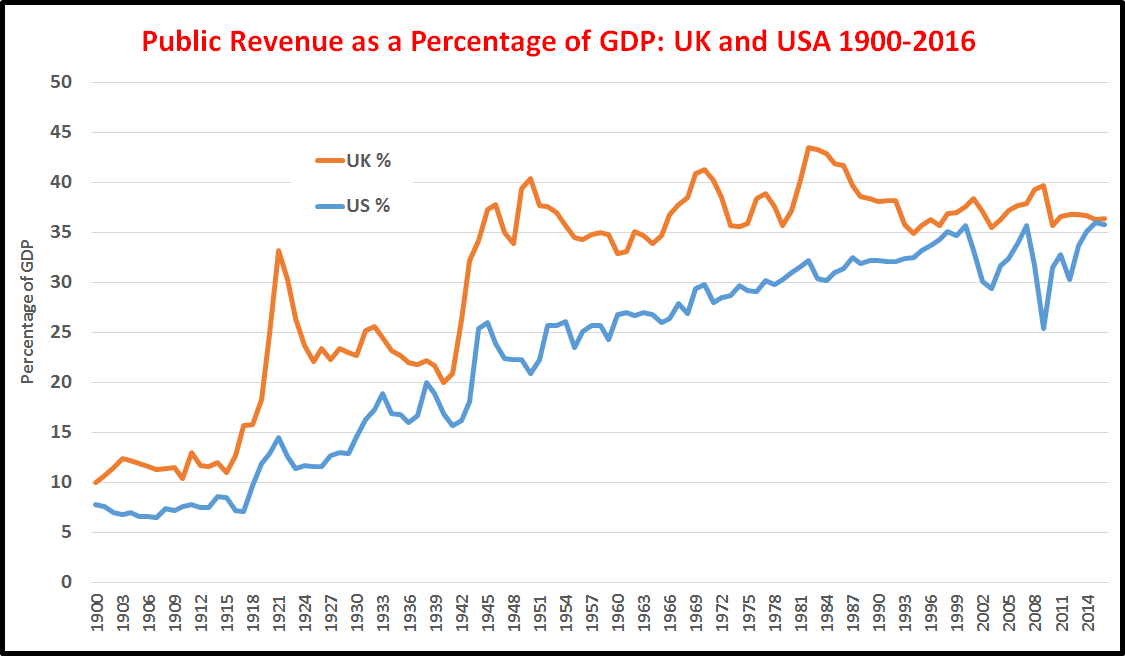
The above figure shows the tax revenues, from national, state and local government combined, for the UK and the USA from 1900 to 2016. The alleged era of “neoliberalism” from the 1970s has not been associated with declining tax revenues. If anything, the “neoliberal” era of a minimal state was pre 1914, not post-1975.
What is characteristic of fiscal policy in the UK and USA is not the alleged “neoliberal” overall reduction of taxation but a lightening of taxation on the rich, and a failure to redistribute sufficiently, in the face of widening inequality.
Klein is probably right to suggest: “A good chunk of Trump’s support could be peeled away if there were a genuine redistributive agenda on the table.” But she, with Corbyn and Monbiot, are wrong to chime in with the crude anti-market mantras that have disabled the Left for 180 years. In building a redistributive agenda we must look to Thomas Paine, rather than Robert Owen or Karl Marx.
Privatisation: against dogma
By contrast, Monbiot’s other point, about growing privatisation since the 1970s, has been borne out by the evidence. In the UK, USA and much of the world there has been massive privatisation and outsourcing of public services.
 Unlike any false claim that “neoliberalism” has reduced overall taxes, the increase of privatisation is manifest. In addition, it has sometimes led to deleterious consequences including lower pay for workers and a reduced quality of services.
Unlike any false claim that “neoliberalism” has reduced overall taxes, the increase of privatisation is manifest. In addition, it has sometimes led to deleterious consequences including lower pay for workers and a reduced quality of services.
But Corbyn and Monbiot speak and write as if privatisation is necessarily bad – always and everywhere it is seen as a negative policy. This doctrinaire stance simply inverts the claim of the crudest free marketeers, who claim that state provision is always bad and that private provision is always good. The Corbyn-Monbiot stance simply turns this upside-down. It is equally dogmatic. It is based on ideology, not evidence.
Regarding markets as always bad, amounts to agoraphobia or fear of markets (from the Greek words agora for market, and phobia for fear). This is an inversion of the kratophobia of the free-marketeers – a fear of government or of the state.
Instead of these ideologically-driven, simplistic positions, it is necessary to be more pragmatic. Some privatisations work. Others do not. Some state provision is effective. Some is wasteful and inefficient. We need to look at individual cases to understand why.
There are many case studies to look at and they are too wide-ranging to be reviewed here. A good start would be to look at an important early article on privatisation by John Goodman and Gary Loveman in the Harvard Business Review. They wrote:
“the issue is not simply whether ownership is private or public. Rather, the key question is under what conditions will managers be more likely to act in the public’s interest … managerial accountability to the public’s interest is what counts most, not the form of ownership.”
Goodman and Loveman argued that profits and the public interest overlap best when the privatised organisation is in a competitive market. Competition from other companies can discipline managerial behaviour. Consequently, there is little point in privatisation if competition is lacking.
Subsequent research has shown that other factors are involved as well. Instead of being driven by dogma, we need to be pragmatic and experimental, taking account of research.
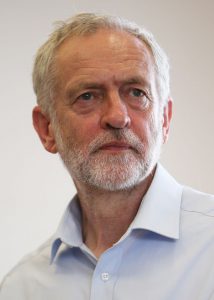
Jeremy Corbyn
You may respond that Corbyn is pragmatic, because he has declared that he is in favour of a mixed economy: he accepts a private as well as a public sector. But notice the imbalance in his presentations. He treats public provision as ideal, and the private sector as an expedient to be tolerated, at least for a while.
Corbyn says he accepts a mixed economy, but he has offered has no defence of private sector. His “mixed economy” could be a stopping point on the road to a fully-socialist planned economy, where private enterprise is pushed to the side-lines.
Declining public provision?
 Ken Loach’s moving film, I, Daniel Blake, portrays the heart-breaking human consequences of the UK Conservative government’s shredding of the welfare safety net for the poor. Attempts to reduce public spending in many countries have led to millions of human tragedies like this.
Ken Loach’s moving film, I, Daniel Blake, portrays the heart-breaking human consequences of the UK Conservative government’s shredding of the welfare safety net for the poor. Attempts to reduce public spending in many countries have led to millions of human tragedies like this.
Doctrinaire austerity policies – which fail in their own terms because they depress economic demand for goods and services and create more unemployment – have been adopted by many governments and imposed by the European Union.
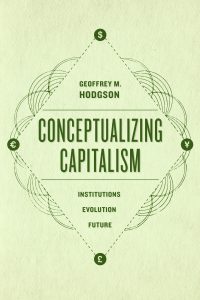 All this is real, and tragic. Millions have suffered because of such misguided policies. But we should not jump to the conclusion that “neoliberalism” has been successful in moving toward a minimal economic role for the state.
All this is real, and tragic. Millions have suffered because of such misguided policies. But we should not jump to the conclusion that “neoliberalism” has been successful in moving toward a minimal economic role for the state.
In my book Conceptualizing Capitalism I examined differences and changes in public social spending in different developed countries from 1980 to 2005, using OECD data. The principal components of public social spending include health services, old age benefits, unemployment benefits, incapacity-related benefits, family support, active labour market public programs, and housing benefits.
Amounts of public spending as percentages of GDP (in 1980 and 2005) are shown below.
|
1980 |
2005 |
change |
| Australia |
10.3 |
16.5 |
+6.2 |
| Austria |
22.4 |
27.1 |
+4.7 |
| Belgium |
23.5 |
26.5 |
+3.0 |
| Canada |
13.7 |
16.9 |
+3.2 |
| Denmark |
24.8 |
27.7 |
+2.9 |
| Finland |
18.1 |
26.2 |
+8.1 |
| France |
20.8 |
30.1 |
+9.3 |
| Germany |
22.1 |
27.3 |
+5.2 |
| Italy |
18.0 |
24.9 |
+6.9 |
| Japan |
10.2 |
18.5 |
+8.3 |
| Netherlands |
24.8 |
20.7 |
–4.1 |
| Norway |
16.9 |
21.6 |
+4.7 |
| Portugal |
9.9 |
23.0 |
+13.1 |
| Spain |
15.5 |
21.1 |
+5.6 |
| Sweden |
27.1 |
29.1 |
+2.0 |
| Switzerland |
13.8 |
20.2 |
+6.4 |
| UK |
16.5 |
20.5 |
+4.0 |
| US |
13.2 |
16.0 |
+2.8 |
Public Social Spending as Percentage of GDP in Selected Countries
Most countries increased their public social spending, during a period when the ideology of privatization was resurgent. The Netherlands is an exception. Note that the increases in public social spending are not explained by rises in unemployment benefit, because generally this comprises a small proportion of public social spending.
Of course, it needs to be emphasised that there is an ideologically-driven agenda that has led to deep cuts in some welfare and has been gravely damaging for the poor. But we are far from re-entering the era of the minimal state.
Pursuing unicorns
Much of the hysteria against “neoliberalism” draws from the Left’s deep rooted antipathy to markets. Let’s briefly address this.
First, they may be alternatives to markets in modern, large-scale economic systems but they would greatly out-do the miseries inflicted on the fictional Daniel Blake and his millions of real-world counterparts.
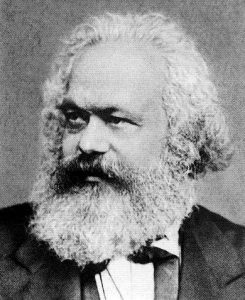
Karl Marx
Every attempt to get rid of markets, since Robert Owen and Karl Marx proclaimed their redundancy in the nineteenth century, has led to famine, repression and the termination of democracy. Look to Stalin’s Russia, Mao’s China, Cambodia, Cuba and Venezuela. Twentieth-century Communism resulted in over 90 million deaths.
In the light of twentieth-century experience it would be worse than foolhardy to make yet another attempt to minimise markets, or as Klein oddly put it, “corporate trade”.
A better way is possible, but it involves taming and supplementing markets, not repressing them. It means regulating corporations, not casting them as sorcerers of evil. But sadly, agoraphobia still afflicts many on the left.
“It seems to me that the questions we urgently need to ask ourselves are these: is totalitarianism the only means of eliminating capitalism? If so, and if … we abhor totalitarianism, can we continue to call ourselves anti-capitalists? If there is no humane and democratic answer to the question of what a world without capitalism would look like, then should we not abandon the pursuit of unicorns, and concentrate on capturing and taming the beast whose den we already inhabit?”
Excellent. But since then he has gone down the rocky road of blaming “neoliberalism” for “all our problems”. Without defending some role for private property or markets, he thereby allies himself with the many leftists who now describe anyone defending private property or markets as “neoliberal”.
Has Monbiot now abandoned the idea of taming the capitalist beast? Does he wish to kill it instead?
In April 2016 he wrote: “Every invocation of Lord Keynes is an admission of failure.” So he junked the best macroeconomic theory we have for limiting some of the excesses of capitalism. His grounds for doing so were these:
“Keynesianism works by stimulating consumer demand to promote economic growth. Consumer demand and economic growth are the motors of environmental destruction.”
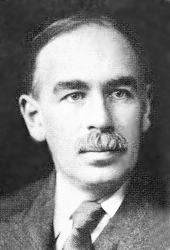
John Maynard Keynes
Wrong. “Consumer demand and economic growth” can destroy the planet, but only if that demand and growth relate to non-renewable material resources. Much demand and growth in modern economies is for services. Intangible assets now make up much of corporate wealth. For example, there are demands for information and education, and such services are added to GDP. There is no necessary reason why economic growth in a modern information-rich economy should ruin the planet. Keynes is still relevant.
Those that have pursued unicorns have imagined that it is possible to design a better system than capitalism. Monbiot says the same, declaring that for the Left
“the central task should be to develop an economic Apollo programme, a conscious attempt to design a new system, tailored to the demands of the 21st century.”
This puts him in full, unicorn-chasing mode. One of the biggest mistakes by early socialists was to ignore the massive complexity of modern economic systems and attempt to “design a new system” at the behest of some utopian dreamer.
Instead, what is required is careful, incremental, experimental change, retaining the flexibility and devolved autonomy afforded by widespread private property. This autonomy allows for multiple experiments and deeper learning from mistakes.
While state intervention is necessary, no complete or adequate overall “design” is possible, because of the way much knowledge is irretrievably dispersed throughout the economy. The economies of the twenty-first century are more knowledge-intensive than those before. Hence the possibilities of comprehensive central planning or “design” are even more limited.
Neoliberalism and economic man
“as modern psychology and neuroscience make abundantly clear – human beings, by comparison with any other animals, are both remarkably social and remarkably unselfish. The atomisation and self-interested behaviour neoliberalism promotes run counter to much of what comprises human nature.”
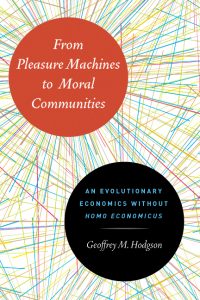 The first sentence is valid and important. The second is simplistic. As I elaborate in my book From Pleasure Machines to Moral Communities, strong evidence from psychology, evolutionary biology and primatology shows that the picture of self-seeking “economic man”, which dominated mainstream economics until recently, is deeply flawed.
The first sentence is valid and important. The second is simplistic. As I elaborate in my book From Pleasure Machines to Moral Communities, strong evidence from psychology, evolutionary biology and primatology shows that the picture of self-seeking “economic man”, which dominated mainstream economics until recently, is deeply flawed.
But that does not mean that we can or should get rid of markets. Our capacities for cooperation evolved culturally and genetically because our ancestors hunted and foraged in groups, rarely numbering more than 200 individuals, for millions of years. Relying on emotions and facial expressions, we developed sophisticated social mechanisms to engender trust and cooperation, and to enforce social rules.
As larger-scale cities emerged about 14,000 years ago, these face-to-face mechanisms could no longer be relied upon exclusively to regulate social interactions. Institutions such as law, property and contract were developed to deal with these more impersonal, non-familial, transactions.
Every human civilisation that has developed has relied on property, trade and contracts. These require different enforcement mechanisms, but they too require measures of trust and moral obligation, as Adam Smith made clear in his Theory of Moral Sentiments. The idea that markets inevitably corrode away all social ties is mistaken.
Even the Soviet-style economies of the twentieth century relied on some private property and trade. They failed because state bureaucracy stifled autonomy and innovation. China grew rapidly when it expanded the private sector after 1978.
Of course, the spread of the market would be detrimental if it invaded all our social relations, attempting to put prices on love and friendship and reducing everything else to money transactions. But a system of private property provides a degree of autonomy that is required to maintain non-market interactions at home and at work. Successful corporations create islands of cooperation and teamwork within their organisational boundaries.
 Impersonal relations occur in bureaucracies as well as in markets. Large-scale systems of national planning also make much interaction impersonal. People become atomised; they become numbers, to be processed by bureaucrats and computers.
Impersonal relations occur in bureaucracies as well as in markets. Large-scale systems of national planning also make much interaction impersonal. People become atomised; they become numbers, to be processed by bureaucrats and computers.
The experience of centrally-planned economies in Russia, China and Eastern Europe shows that systems of state planning can be cesspits of human alienation and corruption, governed impersonally by disillusioned bureaucrats and corrupt state officials. I recommend the film The Lives of Others for a glimpse into that dark world.
Abandoning neoliberalism
I have written at further length elsewhere on the limits to markets. I accept Hayek’s explanation that comprehensive overall planning is dysfunctional. But I do not accept that everything should or can become a monetary transaction in its place.
Indeed, the growing use of information in a capitalist economy puts limits on the role of information as property. Furthermore, the very freedom of waged employees means that there are constraints on entering into contracts for future work. There are limited futures markets for labour. For such reasons, capitalism can never be a 100 per cent market system.
Hayek failed to acknowledge fully the limits to markets. Such free marketeers are the mirror-image of socialists who fail to acknowledge adequately that there are limits to common ownership. We have to transcend both agoraphobia and kratophobia.
Agoraphobics react adversely to any tolerance of markets. Hence economic interventionists such as Tony Blair, and supporters of public healthcare such as Hillary Clinton, have recently and frequently been accused of being neoliberals. This is misleading and absurd.
As Colin Talbot has pointed out, “neoliberalism” has become “a term of abuse” to be used against “any type of pro-market reform or political position that recognizes markets may – in the right circumstances – be a good thing”. Consequently, everyone “from moderate social democrats to the most lurid free-marketeers gets lumped together under a convenient ‘neoliberal’ label.”
In a brilliant survey of its usage since the 1980s, Rajesh Venugopal concluded that “neoliberalism has become a deeply problematic and incoherent term that has multiple and contradictory meanings, and thus has diminished analytical value.”
Some may wish to retain the “neoliberal” label, to apply it to those free marketeers who attempt to shrink radically the size of the state, and to privatise anything that walks. The definition could be further sharpened by adding advocacy of economic austerity. It could also could be sharpened by including deregulation of the financial sector.
 But such nuances have been lost in a global storm of “neoliberal” accusations. Klein and Monbiot have added some force and authority to this widening tempest.
But such nuances have been lost in a global storm of “neoliberal” accusations. Klein and Monbiot have added some force and authority to this widening tempest.
They do not confine their accusations to the likes of Hayek. Most seriously, they pointed the “neoliberal” finger at Hillary and Bill Clinton, as Corbyn made the “forces of globalisation” jibe at Barack Obama.
If it means anything, neoliberalism is an ideology and only partly a reality. Austerity and welfare cuts have wreaked havoc, but markets and private enterprise have lifted millions out of poverty. Agoraphobic accusations of “neoliberalism” miss the latter point.
“Neoliberalism” gave us Trump
We may ask: what part did the accusers of “neoliberalism” have to play in Trump’s victory? The constant tainting of Hillary Clinton as a “neoliberal” may have helped to persuade many Democratic supporters to stay at home. We know from the data that the below-par turnout by Democrats – especially by the young – was decisive in losing those swing states.
Tainting Hillary Clinton as a “neoliberal” could have played a part in clinching Trump’s success. If so, “neoliberalism” gave us Trump, but not in the way that Klein and Monbiot suggest.
18 November 2016
Minor edits – 19, 25, 30 November, 15, 28 December 2016
|
My forthcoming book elaborates on some of the political issues raised in this blog:
Wrong Turnings: How the Left Got Lost
To be published by University of Chicago Press in November 2017
|
Bibliography
BBC News (2016) ‘Jeremy Corbyn outlines Labour’s vision of a “new economics”’, 21 May. http://www.bbc.com/news/uk-politics-36351149.
Chantrill, Chrisopher (2016a) ‘UK Public Revenue’. http://www.ukpublicrevenue.co.uk/uk_national_revenue_analysis
Chantrill, Chrisopher (2016b) ‘US Government Revenue’. http://www.usgovernmentrevenue.com/revenue_history
Elgot, Jessica (2016) ‘Corbyn backs reduction of NATO presence along Russia’s borders’, The Guardian, 13 November. https://www.theguardian.com/politics/2016/nov/13/jeremy-corbyn-hints-at-reducing-nato-presence-russia-putin?CMP=share_btn_tw.
Elliott, Larry (2016) ‘Trump’s economic view is far from neoliberal, but it rides a populist wave’, The Guardian, 31 July. https://www.theguardian.com/business/2016/jul/31/trumps-economic-view-is-far-from-neoliberal-but-it-rides-a-populist-wave.
Goodman, John B. and Loveman, Gary W. (1991) ‘Does privatization serve the public interest?’ Harvard Business Review, November-December. https://hbr.org/1991/11/does-privatization-serve-the-public-interest.
Hodgson, Geoffrey M. (2013) From Pleasure Machines to Moral Communities: An Evolutionary Economics without Homo Economicus (Chicago: University of Chicago Press).
Hodgson, Geoffrey M. (2015) Conceptualizing Capitalism: Institutions, Evolution, Future (Chicago: University of Chicago Press).
Hodgson, Geoffrey M. (2017) Wrong Turnings: How the Left Got Lost (Chicago: University of Chicago Press, forthcoming).
Johnson, Christopher (1991) The Economy under Mrs Thatcher (Harmondsworth: Penguin).
Klein, Naomi (2016) ‘It was the Democrat’s embrace of neoliberalism that won it for Trump’, The Guardian, 9 November. https://www.theguardian.com/commentisfree/2016/nov/09/rise-of-the-davos-class-sealed-americas-fate.
Monbiot, George (2003) ‘Rattling the Bars’, The Guardian, 18 November. See http://www.monbiot.com/2003/11/18/rattling-the-bars/.
Monbiot, George (2016a) ‘Neoliberalism – the ideology at the root of all our problems’, The Guardian, 15 April. https://www.theguardian.com/books/2016/apr/15/neoliberalism-ideology-problem-george-monbiot.
Monbiot, George (2016b) ‘Neoliberalism: the deep story that lies beneath Donald Trump’s triumph’, The Guardian, 14 November. https://www.theguardian.com/commentisfree/2016/nov/14/neoliberalsim-donald-trump-george-monbiot.
O’Hara, Glen (2016) ‘Stop saying that Trumpism is about economics’, 15 November. http://publicpolicypast.blogspot.co.za/2016/11/stop-saying-that-trumpism-is-about.html.
Pagano, Ugo (2014) ‘The Crisis of Intellectual Monopoly Capitalism’, Cambridge Journal of Economics, 38(6), November, pp. 1409-29. http://cje.oxfordjournals.org/content/early/2014/08/04/cje.beu025.
Sahadi, Jeanne (2010) ‘Taxes: What people forget about Reagan’, CNN Money, 12 September. http://money.cnn.com/2010/09/08/news/economy/reagan_years_taxes/.
Talbot, Colin (2016) ‘The myth of neoliberalism’, 31 August. https://colinrtalbot.wordpress.com/2016/08/31/the-myth-of-neoliberalism/.
Velasco, Andrès (2016) ‘The Real Roots of Populism’, Project Syndicate, 28 July. https://www.project-syndicate.org/commentary/real-roots-of-populism-by-andres-velasco-2016-07?backaction=
Venugopal, Rajesh (2015) ‘Neoliberalism as a Concept’, Economy and Society, 44(2), pp. 165-87. http://www.tandfonline.com/doi/abs/10.1080/03085147.2015.1013356.
Posted in Common ownership, Donald Trump, George Monbiot, Jeremy Corbyn, Karl Marx, Left politics, Liberalism, Markets, Naomi Klein, Nationalization, Populism, Private enterprise, Right politics, Tony Blair, Uncategorized
October 15th, 2016 by geoffhodgson1946
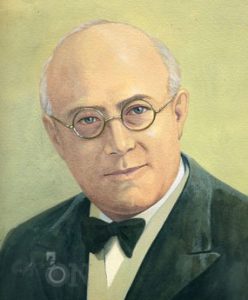
Geoffrey M. Hodgson
Karl Polanyi (1886-1964) was a Hungarian-born social scientist of major importance. His most famous and influential work is The Great Transformation, published in English in 1944. Especially since the economic crash of 2008, Polanyi has been cited as a key critic of the ‘market economy.’
 Polanyi has been repeatedly cited by popular academics and journalists including Paul Mason, Mariana Mazzucato and George Monbiot. Polanyi’s work is said to be of great contemporary significance, with major implications for current economics and politics.
Polanyi has been repeatedly cited by popular academics and journalists including Paul Mason, Mariana Mazzucato and George Monbiot. Polanyi’s work is said to be of great contemporary significance, with major implications for current economics and politics.
Polanyi argued in The Great Transformation (GT) that, for much of human history, economic activity has been governed by non-market principles, notably reciprocity (voluntary cooperation and the informal exchanges of favours) and redistribution (the use of levies or taxes for communal projects and to help individuals in need).
According to Polanyi, these longstanding mechanisms of economic operation were deeply disrupted in England in the late eighteenth century, with the growth of markets and the increasing use of monetary valuation. In particular, markets for land and wage labour played an increasingly significant role, tearing apart the fabric of society.
The alleged nature of ‘the great transformation’
Polanyi made a number of observations on this ‘great transformation’:
-
Human motives and objectives were transformed:
‘The transformation implies a change in the motive of action on the part of the members of society: for the motive of subsistence that of gain must be substituted. All transactions are turned into money transactions …’ (GT p. 41)
-
To work effectively a market system must be free of state and other interference:
‘the most startling peculiarity of the [market] system lies in the fact that, once it is established, it must be allowed to function without outside interference.’ (GT p. 41)
The ‘market economy implies a self-regulating system of markets … it is an economy directed by market prices and nothing but market prices.’ (GT p. 43)
-
But allowing the market system to operate fully results in the destruction of social bonds:
‘the idea of a self-adjusting market implied a stark utopia. Such an institution could not exist for any length of time without annihilating the human and natural substance of society … To allow the market mechanism to be the sole director of the fate of human beings and their natural environment … would result in the demolition of society.’ (GT pp. 3, 73)
-
Consequently, policy-makers were obliged to intervene to regulate markets dealing in labour, land and money:
‘Social history in the nineteenth century was thus the result of a double movement … While on the one hand markets spread all over the face of the globe and the amount of goods involved grew to unbelievable proportions, on the other hand a network of measures and policies was integrated into powerful institutions designed to check the action of the market relative to labour, land, and money. … Society protected itself against the perils in a self-regulating market system …’ (GT p. 76)
-
The state was necessarily involved in the creation as well as the regulation of the market system:
‘There was nothing natural about laissez-faire; free markets could never have come into being merely by allowing things to take their course … laissez-faire itself was enforced by the state. … The road to the free market was opened and kept open by an enormous increase in continuous, centrally organized and controlled interventionism. … [T]he introduction of free markets, far from doing away with the need for control, regulation and intervention, enormously increased their range. Administrators had to be constantly on the watch to ensure the free workings of the system.’ (GT pp. 139-41)
Problems and inconsistencies
Many have sympathized with Polanyi’s concern about the potentially destructive, destabilizing or debasing effects of an unleashed market economy. There are limits to commodification and markets. But as a careful reading of the above quotations shows, there are some problems and inconsistencies in Polanyi’s argument.
The first problem is that Polanyi sides with extreme, free-market economists who argue that the market is ‘self-adjusting’ or ‘self-regulating’ and always works best when there is no state interference (see claim 2 above).
By contrast, there is a long tradition in (both mainstream and non-mainstream) economics that has shown why markets are not self-regulating and intervention is required. Consider the writings of a multitude of writers including Arthur Pigou, John Maynard Keynes, Paul Krugman and Joseph Stiglitz. Their reasons include externalities, information problems, transaction costs, insufficient effective demand, and so on. Consequently, markets require some regulation or other intervention to work well.
 The second problem is that Polanyi (like many mainstream economists) pays insufficient attention to the fact that markets require institutions such as property, contract law, a legal system of enforcement, regulation of standards and so on. Consequently, as I argue at length in my book Conceptualizing Capitalism, a modern market economy requires a state, to constitute as well as to maintain a modern market system.
The second problem is that Polanyi (like many mainstream economists) pays insufficient attention to the fact that markets require institutions such as property, contract law, a legal system of enforcement, regulation of standards and so on. Consequently, as I argue at length in my book Conceptualizing Capitalism, a modern market economy requires a state, to constitute as well as to maintain a modern market system.
The third problem is that Polanyi is inconsistent. The fifth observation in the preceding section – making the important point that ‘laissez-faire itself was enforced by the state’ and required regulators ‘constantly on the watch’ to make it work – undermines the second claim that the market is ‘self-adjusting’ or ‘self-regulating’.
The fifth observation is valid and important in my view, but can be strengthened by an appreciation that the state and other institutions are required to constitute, and not simply to regulate, a modern market economy.
When writers such as Mason and Mazzucato refer to Polanyi, they typically refer to the important claim that the market requires the state to survive, but they overlook Polanyi’s repeated contradictory statements that the market must be ‘self-regulating’ in order to work.
Such writers rightly refer to the limits to markets and the possibility that they can undermine other beneficial social relations, but they often ignore the fact that Polanyi, as I shall explain below, wanted to get rid of real markets altogether.
Cherry-picking some statements from Polanyi but ignoring others is not good scholarship.
More havoc – Polanyi on commodities
Despite its insights, Polanyi’s book is confused and lacking in rigour. I go into more detail on this in an article I published on Polanyi in the Review of Social Economy in 2017. As an example, consider his concept of a commodity. Polanyi wrote that:
‘Commodities are here empirically defined as objects produced for sale on the market … labor, land, and money are obviously not commodities’ (GT p. 72).
But a few pages before, Polanyi had written:
‘Self-regulation implies that all production is for sale on the market and that all incomes derive from such sales. Accordingly, there are markets … not only for goods (always including services) but also for labor, land, and money’ (GT p. 69).
A few pages later Polanyi again admitted that labour could be bought and sold: ‘No market economy was conceivable that did not include a market for labor.’ (GT p. 77)
Polanyi again contradicted his claim that labour was not a commodity: ‘The mechanism of the market was asserting itself and clamoring for its completion: human labor had to be made a commodity’ (GT p. 107).
This is a major confusion. If labour by definition is not a commodity then it cannot be made into one. Polanyi’s definition of a commodity is also unclear: does ‘produced for sale’ mean ‘intentionally produced for sale’? Even here there is a problem, because reclaimed land, slaves and money can be intentionally produced for sale.
What Polanyi might have been trying to get at was that labour, land and money are different from other commodities, like potatoes or widgets. This is true, but he fails to explain why. (I give some reasons why labour and money are special commodities in my Conceptualizing Capitalism book.)
For these and other reasons I concur with the sociologist Isaac Martin, who concluded that Polanyi’s book is ‘a mess’ and ‘conceptually sloppy’ with several key terms undefined. Other terms are defined ‘and then used willy-nilly, as if Polanyi forgot what he said the words meant.’
The serious conceptual flaws in Polanyi’s work have still so far received insufficient attention.
The dead discourse on ‘embeddedness’
Polanyi’s work has given rise to a longstanding debate on the relation between the economy and society. But this has got bogged down, partly because the definitions of ‘economy’ and ‘society’ are problematic.
In my Review of Social Economy article I show that in the Great Transformation Polanyi distinguished between economy and society primarily in terms of motives. Economic motivation refers to self-interest and greed, while social motives include reciprocity and redistribution, as mentioned above.
But Polanyi did not use the term ‘embedded’ very often in his famous book. It appears only six times in The Great Transformation, and ‘embeddedness’ has not been found there at all. Polanyi does makes statements such as the ‘economic system was submerged in general social relations’, and uses additional terms such as ‘enmesh,’ ‘absorb’ or ‘contain’ to describe the relationship between the ‘economic’ and the ‘social’.
Given Polanyi’s use of these terms, the notion of the ‘economy being embedded in social relations’ suggests that material production and distribution are entangled with relations and motives concerning rank, status and security.
This is important, but much of the literature on ‘embeddedess’ fails to reach this limited level of precision.
Even sympathetic accounts of Polanyi’s work see major problems. For example Gareth Dale concluded that
‘Polanyi’s use of the term “embeddedness” can appear indistinct, or beset by contradiction. … Polanyi’s use of the term tends to drift towards the commonplace that “the economy is embedded in institutions.”’
The sociologist Neil Fligstein reported that the ‘empirical literature has failed to clarify the precise nature of social embeddedness.’ In the 1980s, Marc Granovetter was a pioneering sociological contributor to the ‘embeddedness’ literature. But later he wrote:
‘I rarely use “embeddedness” any more, because it has become almost meaningless, stretched to mean almost anything, so that it therefore means nothing’ (in Krippner et al. 2004).
Partly because of its dependence on ill-defined terms, the discourse on embeddedness has largely reached a dead end.
Polanyi’s analysis has misled politics
Polanyi’s work has been criticised in some respects by economic historians. Deirdre McCloskey and others have argued that market economies were prominent much earlier than the eighteenth century.
 The Great Transformation contains a chapter on the Speenhamland Law of 1795, which implemented a form of outdoor relief intended to mitigate rural poverty in England.
The Great Transformation contains a chapter on the Speenhamland Law of 1795, which implemented a form of outdoor relief intended to mitigate rural poverty in England.
Contrary to Polanyi’s claim that it was a widespread, flawed and catastrophic last-ditch attempt to stop the expansion of markets for agricultural labour, even Polanyi sympathizers such as Fred Block and Margaret Somers (2003, 2014) cited a large body of scholarship showing that the use of the Speenhamland system was not widespread and it did not generally depress wages. Also Polanyi underestimated the earlier development of wage labour in England.
Polanyi tried to use the Speenhamland legislation to show that attempts to block the ‘self-regulating’ market were counter-productive. For him, it showed that market system required a market for labour as well: ‘The attempt to create a capitalistic order without a labor market had failed disastrously’ (GT p. 80).
But even if the Speenhamland law had failed (which is subject to doubt) this does not validate Polanyi’s claim that if there are to be markets, then there must be markets for everything. On the contrary, as I explain in my 2015 book, missing markets are unavoidable, even within capitalism.
Polanyi’s graphic description of the ‘catastrophic’ results of this law drew the attention of several pro-market economists and politicians, who cited and republished the Speenhamland chapter. Polanyi’s focus on universal ‘self-regulating’ markets did not go unnoticed.
 US Republican President Richard Nixon was once in favour the idea of a universal basic income, and drew up a plan to implement it. But then he abandoned the idea. According to Rutger Bregman, he was persuaded by reading Polanyi’s Speenhamland chapter that such measures would have an excessive downside risk, by dis-incentivizing work.
US Republican President Richard Nixon was once in favour the idea of a universal basic income, and drew up a plan to implement it. But then he abandoned the idea. According to Rutger Bregman, he was persuaded by reading Polanyi’s Speenhamland chapter that such measures would have an excessive downside risk, by dis-incentivizing work.
Another major problem with Polanyi’s analysis is its focus on the deleterious effects of markets, and not on unique aspects of the modern capitalist system. If we include such features as a modern financial system in the definition of capitalism, then markets have existed for much longer than capitalism.
By focusing on the general growth of markets, Polanyi downplayed the emergence of key institutions that powered the eighteenth-century transformation into a capitalist economy. By contrast, both John Commons and Joseph Schumpeter saw the development of financial institutions – rather than markets in general – as crucial in this regard. By contrast, Polanyi gave more emphasis to the extension of markets, not the growth of specific financial institutions, as the grounding of capitalism.
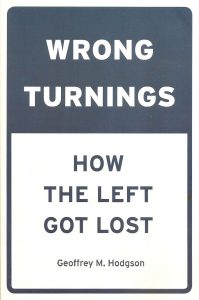 While some public ownership and planning may be desirable, I argue in my Conceptualizing Capitalism (2015) and Wrong Turnings (2018) books that a modern complex economy is unfeasible without extensive markets. Furthermore, the ownership and exchange of property is a human right, the abolition of which would endanger freedom.
While some public ownership and planning may be desirable, I argue in my Conceptualizing Capitalism (2015) and Wrong Turnings (2018) books that a modern complex economy is unfeasible without extensive markets. Furthermore, the ownership and exchange of property is a human right, the abolition of which would endanger freedom.
I argue in Conceptualizing Capitalism that markets as such do not necessarily generate inequality. By contrast capitalism contains mechanisms that can greatly exacerbate the unequal distribution of income and wealth. We need to address these mechanisms, rather than embarking on a misguided mission to abolish markets.
Polanyi’s unfeasible socialism
But Polanyi wished to abolish the right to own and trade property, with the exception of immediate personal and household items.
As Gareth Dale related in detail in his 2010 book, in the 1920s Polanyi proposed a form of full-blooded socialism, building on the ideas from his English friend and academic, G. D. H. Cole. Another major inspiration for Polanyi was Robert Owen, who saw socialism as the abolition of private property.

G D H Cole
Cole’s vision of ‘guild socialism’ was of an integrated, national system where ‘a single authority is responsible both for the planning of the social production as a whole and for the distribution of the incomes which will be used in buying it.’ Within this ‘single authority’ he also sought devolved worker control, where groups of individuals would make democratic decisions on how production was organised and products were distributed.
Polanyi wished to avoid the impersonality of the market and build a socialism infused by the empathy and cooperation of the community. The economic system would return to reciprocity and redistribution as primary allocative mechanisms.
To Cole’s impractical notions of local devolution and democracy, Polanyi added a ‘pseudo-market mechanism’ with non-tradable ‘token money’, while retaining overall state ownership and ultimate control.
Polanyi did not fully grasp that interpersonal empathy and intimate cooperation can serve as the principal basis of social integration and economic production in small-scale communities only.
Effective reciprocity relies on personal contact and face-to-face interactions that are possible in relatively small societies, numbering hundreds rather than millions. In large-scale societies, additional mechanisms are required. These involve markets and political institutions.
Like Owen and Cole, Polanyi did not understand that the autonomy of groups or individuals is deeply compromised if they are deprived of rights to own and trade property.
Conclusion
Polanyi is an enormously stimulating writer who tackled some major problems of our time. But despite this, his analysis is flawed, opaque and riven by internal contradictions. Furthermore, uncritical citation of Polanyi can help fuel a form of Leftist, socialist politics that is both unfeasible and undesirable. We need to recognise his severe limitations, as well as his valuable insights.
15 October 2016
Minor edits – 18-20 Oct 2016, 11 April 2017.
Bibliography
Block, Fred and Somers, Margaret (2003) ‘In the Shadow of Speenhamland: Social Policy and the Old Poor Law’, Politics and Society, 31(2), June, pp. 283-323.
Block, Fred and Somers, Margaret (2014) The Power of Market Fundamentalism: Karl Polanyi’s Critique (Cambridge MA: Harvard University Press).
Bregman, Rutger (2016) ‘Nixon’s Basic Income Plan’, Jacobin, 5 May. Available at https://www.jacobinmag.com/2016/05/richard-nixon-ubi-basic-income-welfare/?utm_campaign=shareaholic&utm_medium=twitter&utm_source=socialnetwork.
Dale, Gareth (2010) Karl Polanyi: The Limits to the Market (Cambridge: Polity Press).
Cole, George D. H. (1920) Guild Socialism Re-Stated (London: Parsons).
Dale, Gareth (2010) Karl Polanyi: The Limits to the Market (Cambridge: Polity Press).
Fligstein, Neil (1996) ‘Markets as Politics: A Political-Cultural Approach to Market Institutions’, American Sociological Review, 61(4), August, pp. 656-73.
Hejeebu, Santhi and McCloskey, Deirdre (1999) ‘The Reproving of Karl Polanyi’, Critical Review, 13(3-4), pp. 285-314.
Hodgson, Geoffrey M. (2015) Conceptualizing Capitalism: Institutions, Evolution, Future (Chicago: University of Chicago Press).
Hodgson, Geoffrey M. (2017) ‘Karl Polanyi on Economy and Society: A Critical Analysis of Core Concepts’, Review of Social Economy, 75(1), March, pp. 1-15.
Hodgson, Geoffrey M. (2018) Wrong Turnings: How the Left Got Lost (Chicago: University of Chicago Press).
Krippner, Greta R., Granovetter, Mark, Block, Fred, Biggart, Nicole, Beamish, Tom, Hsing, Youtien, Hart, Gillian, Arrighi, Giovanni, Mendell, Margie, Hall, John, Burawoy, Michael, Vogel, Steve, and O’Riain, Sean (2004) ‘Polanyi Symposium: A Conversation on Embeddedness’, Socio-Economic Review, 2(1), January, pp. 109-35.
Martin, Isaac William (2015) ‘Reading The Great Transformation’, Contemporary Sociology, 44(2), March, pp. 163-166.
Polanyi, Karl (1944) The Great Transformation: The Political and Economic Origins of Our Time (New York: Rinehart).
Posted in Uncategorized
September 16th, 2016 by geoffhodgson1946
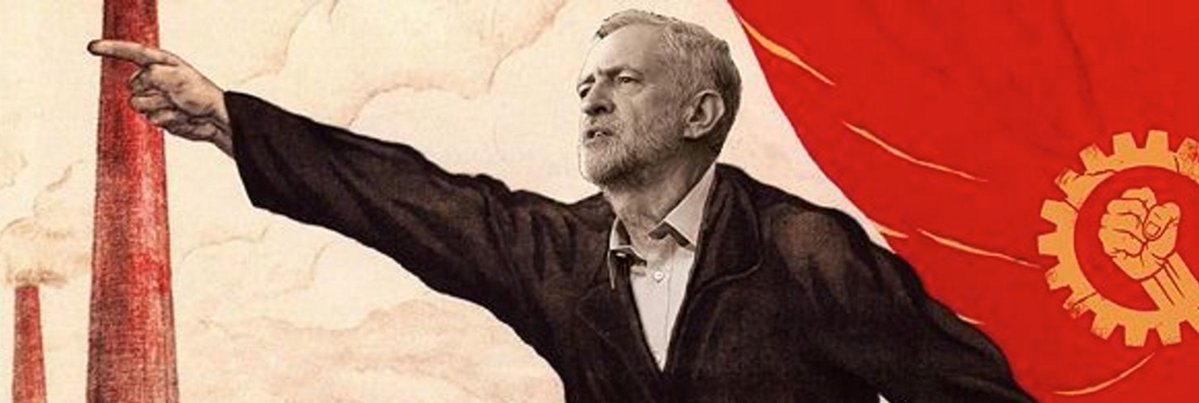
Geoffrey M. Hodgson
There are several different kinds of populism, emanating from both the left and right. But they have in common a view that some powerful minority group are clearly to blame for the ills suffered by a majority. As Julian Baggini put it, in his excellent article on Corbyn’s populism:
‘Populism is … a way of doing politics that has three key features. First, it has a disdain for elites and experts of all kinds, especially political ones. Second, it supposes that the purpose of politics is simply to put into action the will of the people, who are seen as homogenous and united in their goals. Third, it proposes straightforward, simple solutions to what are in fact complex problems.’
Rather than enter into a discussion over political problems and details, populists accuse those who fail to support them as collaborators of the exploiting elite. They believe that the elite is the main obstacle to progress, and solutions will appear once the elite is removed. They are suspicious of experts and dissenters. They are typically vague about their own objectives: their primary aim is to unite the bulk of the population behind a leader, against the elite.
The Great Crash of 2008 undermined confidence in existing elites. For this and other reasons, populism is now on the rise, in both Europe and the USA.
Populism on the Right
The campaign by UKIP to quit the European Union was populism incarnate. Its leader, Nigel Farage, complained frequently that the elites have gained too much power over hard-working ordinary people. Furthermore, elites at the national level had allegedly handed over power to unaccountable rulers in Europe, who have allowed mass immigration and robbed the UK of its sovereignty.
Because of his focus on a nationalist solution, and his identification of foreigners as a primary problem, Farage is an example of a right populist. By championing ‘ordinary British people’ against the establishment, and relying more on sentiment than on reasoned argument or expert advice, he is populist to the core.
 After his success in the Brexit referendum, Farage flew across the Atlantic to show his support for Donald Trump. At his August 2016 speech at a Donald Trump rally in Mississippi, Farage celebrated that Britain ‘chose not to be ruled by unelected old men in Brussels’. He drew parallels between the US and Britain, saying ordinary people everywhere had been ‘let down by government’. He was greeted by rapturous applause.
After his success in the Brexit referendum, Farage flew across the Atlantic to show his support for Donald Trump. At his August 2016 speech at a Donald Trump rally in Mississippi, Farage celebrated that Britain ‘chose not to be ruled by unelected old men in Brussels’. He drew parallels between the US and Britain, saying ordinary people everywhere had been ‘let down by government’. He was greeted by rapturous applause.
Trump’s rhetoric has much in common with that of Farage. Both blame immigrants for the problems in the country. Trump adds his rabid hostility to Muslims.
Corbynism as Left Populism
There are important differences between populists on the left and right. Left populists place less emphasis on the role of immigrants or foreigners: they are more inclusionary. Left populists also tend to favour greater state involvement in the economy. But elements of right populism can find their way into left movements, and vice versa.
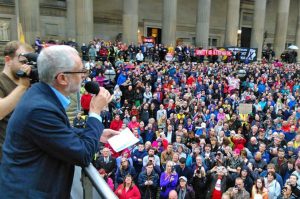 Jeremy Corbyn is very different from Nigel Farage and Donald Trump. Corbyn is neither a racist nor a misogynist (although he has shared political platforms with homophobes and anti-Semites). But Corbynism as a movement has strong populist features.
Jeremy Corbyn is very different from Nigel Farage and Donald Trump. Corbyn is neither a racist nor a misogynist (although he has shared political platforms with homophobes and anti-Semites). But Corbynism as a movement has strong populist features.
Other prominent examples of left populist movements include Syriza in Greece, Podemos in Spain and the ‘socialist’ regime established by the late President Hugo Chávez in Venezuela.
Labour has always been more pragmatic than ideological. Although Corbyn has some Marxist theoreticians close to him, including within his Momentum Praetorian Guard, he has relied much more on populist sentiment rather than Marxist theory.
The recent growth of left populism has been triggered by the crisis within social democracy, the disastrous invasion of Iraq in 2003, increasing economic inequality within leading economies, unaffordable housing, cuts in the welfare state and high rates of unemployment, especially among the young.
Corbynism vaguely promotes ‘socialism’, but there is no apparent agreement on what this means. There is a general suspicion of private enterprise, as well as a justified concern about the excessive power of some large corporations. When difficulties appear, public ownership is typically seen as the simple and obvious cure.
Like all populists, Corbyn rails against the elite. For him it is the rich minority and the large corporations. Like Farage, he identifies an elite that is bolstered by powerful friends abroad. But for Corbyn the most important foreign allies of the despised British elite are in Washington DC. With its anti-West foreign policy, Corbynism is Marxism-Leninism in populist clothing.
Corbynism Undermines Parliamentary Democracy
To public ownership is added the populist Corbynista slogans of ‘democratic control’ or ‘democratic management’ of enterprises. Without any detailed explanation of how this would work, it nevertheless reassures the left-populist followers that they, and not the elite, will somehow be in control. This left-populist slogan of ‘democratic control’ is seen as the obvious and straightforward way to ‘put into action the will of the people’.
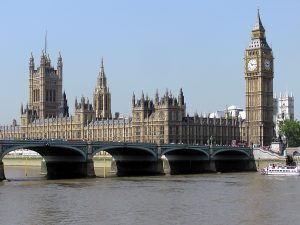
Some extension of worker and community participation is desirable. But it cannot be a substitute for managerial discretion and leadership. Corbyn’s ultra-democracy is infeasible. When it threatens parliamentary democracy it is dangerous.
The Corbynistas want to shift power away from Parliament. They want MPs to follow ‘the will of the people’, which means, in practice, the implementation in Parliament of the resolutions of their local constituency parties. Inadequate heed is taken of the diverse views and interests of the electorate, and the need for expert deliberation and debate to make policy feasible and effective.
Instead of careful, empirically-grounded debate among diverse viewpoints, aimed at developing viable policies to deal with complex economic and political problems, Corbynistas are suspicious of dissent from their official line.
Any defence of markets or private ownership is worrying for them. It challenges their ‘obvious’, ‘democratic’ and simplistic solutions, and therefore must be opposed. Such dissent is branded ‘Blairite’ or ‘red Tory’ or ‘neoliberal’.
Instead of pluralism and extended debate, Corbynism treats the party resolution as the correct line, which all are instructed to follow. There is little appreciation of the complexity of modern politico-economic systems, and the consequent fallibility of all decision making.
Parliamentary institutions have evolved to deal with real-world complexities. They provide some mechanisms to challenge and scrutinise legislation. By moving from representative to delegate democracy, Corbynism would corrode the basic institutions of parliamentary democracy.
Any leader of any political party committed to working through parliament would resign when 80 per cent of his or her parliamentary representatives passed a vote of no confidence in his or her leadership. When this happened, Corbyn did not resign: his primary focus is not on parliament but on the populist ‘mass movement’ outside.
Totalitarian Dangers of Populism – The Example of Venezuela
The record of both left and right populism in power is abysmal. There is an important example of left populism in power, and it is close to Corbyn’s heart.
He has always had a romantic soft spot for Latin American revolutionaries. He wrote in 2011: ‘What the Cubans and … Che Guevara were preaching in the 1960s has an even greater resonance today’. This suggests that armed insurrection is appropriate, even in those Latin American countries that have become democracies.

Jeremy Corbyn and Hugo Chávez
In 1998, the Marxist politician Hugo Chávez was elected as President of Venezuela. Using the high oil revenues during 1999-2007, his government expanded access to food, housing, healthcare, and education, especially for the poor and the indigenous minorities.
Chávez nationalized key industries and created participatory Communal Councils. His ‘Chavista’ populism emphasised the ‘will of the people’, against the rich elite and their perceived allies in the United States.
Chávez created new ‘democratic’ institutions at the base to bolster his power. In 1999, the new Constitutional Assembly, filled with elected supporters of Chávez, drafted a new constitution that made censorship easier and granted the executive branch of government more power. The Constitutional Assembly extended the presidential term. It abolished the two houses of Congress. It also granted Chávez the power to legislate on citizen rights, to promote military officers and to oversee economic and financial matters.
In 2002 Chávez was briefly deposed in a coup, which may have had support from foreign agencies such as the CIA. The hostility of the US government to his regime was no secret. But Chávez was restored to power by the army and popular mobilisations.
Chávez seized control of the courts and the electoral authority, and suppressed much of the opposition media. He removed political checks and balances, seeing them as obstacles to his socialist revolution.

Hugo Chávez
Accordingly, the device of populist democracy was used to push the country in the direction of dictatorship. The high pre-Crash oil revenues were used to address some basic needs and to buy the support of the people. These supporters were then persuaded to approve increases in presidential powers, to protect the ‘socialist revolution’ against its enemies.
Chávez failed to diversify the economy and reduce its reliance on oil. He antagonised private investors. The economy was not robust enough to withstand the post-2008 oil price collapse. His government had become one of the most corrupt in the world. Serious shortages of food and medicine emerged. Chávez died of cancer in 2013 and was replaced as President by Nicolás Maduro.
But Corbyn’s enthusiasm for the regime was undiminished. As late as 2015, when Venezuela was in ever-deepening crisis, he remarked:
‘we celebrate, and it is a cause for celebration, the achievements of Venezuela, in jobs, in housing, in health, in education, but above all its role in the whole world … we recognise what they have achieved.’

Food Shortages in Venezuela
These gave him powers to intervene more heavily in companies and in the currency markets. Arbitrary detentions of dissidents became more common.
In July 2016 he used his executive powers to decree that citizens could be forced to work in the country’s fields for 60-day periods, which may be extended ‘if circumstances merit.’
Starvation became rife. In August 2016 a gang of hungry Venezuelans broke into a zoo and butchered a horse for its meat.
Populism in general, and the left populisms of Chávez, Maduro and Corbyn in particular, are profound threats to any enduring and viable democracy. Using Chávez as a prime example. Kurt Weyland wrote:
‘Determined and politically compelled to boost their personal predominance, populist leaders strive to weaken constitutional checks and balances and to subordinate independent agencies to their will. They undermine institutional protections against the abuse of power and seek political hegemony. Correspondingly, populist leaders treat opponents not as adversaries in a fair and equal competition, but as profound threats. Branding rivals “enemies of the people,” they seek all means to defeat and marginalize them. Turning politics into a struggle of “us against them,” populists undermine pluralism and bend or trample institutional safeguards.’

“There’s no food”
The tragic example of Venezuela is a warning to us all. Like Corbyn, Chávez started with a fairly modest economic programme, closer to social democracy than Marxist orthodoxy. But to bolster his power, Chávez extended state control. Maduro further undermined freedom of speech and put opponents in jail.
Because of a populist mistrust of liberal, pluralist institutions, Venezuela is lurching toward despotism. Currently it retains some semblance of democracy, but press freedom is limited and critical journalists are jailed. Since 2004, ‘defamation’ of the government, including ‘disrespect for the authorities’, has been a criminal offence.
Supporters of Chávez and Maduro blame the hostility of the US for Venezuela’s distress, just as it was blamed for economic problems in Cuba after its 1959 revolution. US belligerence made things worse. But the major cause of economic stagnation in both places is the hobbling of the private sector, and the unchecked concentration of excessive political, legal and economic power in the hands of the overbearing state.
Populism must be Defeated
Although it is unlikely that either UKIP or Corbyn’s Labour will ever win power, they can do serious damage to public debate and the functioning of a parliamentary democracy. In particular, by neutering Labour as a parliamentary force, the UK is deprived of an effective opposition to the Tory government.
 Consider the example of the EU referendum in June 2016. After the result, Corbyn took it for granted that Britain should leave the EU and immediately trigger Brexit, irrespective of the outcome of Britain’s negotiations on the terms of leaving. Like his fellow-populist Farage, Corbyn accepted that ‘the people had spoken’. For him, the expression of popular will was the end of the matter.
Consider the example of the EU referendum in June 2016. After the result, Corbyn took it for granted that Britain should leave the EU and immediately trigger Brexit, irrespective of the outcome of Britain’s negotiations on the terms of leaving. Like his fellow-populist Farage, Corbyn accepted that ‘the people had spoken’. For him, the expression of popular will was the end of the matter.
After the June 2016 vote to leave the EU, Britain is probably in its worse political crisis since the Second World War. It faces years of political and economic uncertainty, with no obvious resolution. In these circumstances, popular frustration and deprivation can feed populism. Left populism has its own dangers, and we know from history that left populists can shift to the right. In turn, right populism can feed fascism.
All populisms, including Corbynism, pose a serious threat to representative democracy. As Baggini put it:
‘Our tradition of representative democracy rests on a rejection of all three pillars of populism. It accepts that a well-run society needs specialists and full-time politicians whose judgments often carry more weight than those of voters who put them into power. It accepts that the “will of the people” is diverse and contradictory, and that the job of politics is to balance competing demands, not simply to obey them. It follows that there are few, if any, easy solutions and that anyone who promises them is a charlatan. Making the case for representative democracy therefore means telling the electorate it doesn’t always know best, a truism that populism has turned into an elitist heresy.’
Populists do not understand that political checks and balances, safeguarded by countervailing politico-economic power, are necessary to help protect democracy and liberty. With confidence in their ‘obvious’ solutions to complex problems, they treat criticism with disdain and close down reasonable discussion. All must ‘unite behind the leader’ who is revered for saving the masses from the enemy elite.
For these reasons Corbynism must be treated as a dangerous ideological threat to a liberal democracy, and not as an infantile, reversible outburst of ultra-leftism.
No-one has a feasible strategy to turn Labour back to its previous form. History offers no clear example of the internal undoing of populist fanaticism. It has always been defeated from outside. Labour is now irretrievable: there is no way of reversing the populist entrenchment within.
Corbyn’s Labour is a danger for the British political system as the Tories are for its economy and for its social fabric. Corbynism is a threat to liberal, pluralist democracy.
We need to build a progressive opposition to both Toryism and Corbynism. We need to defend liberal, pluralist democracy from the populisms of left and right. Building an alternative will take a generation, but we must start now.
16 September 2016
Minor edits: 17,18, 22 September 2016
Major edit: 18 June 2017

Bibliography
Bagehot (2016) ‘Why a “True Labour” splinter party could succeed where the SDP failed’, The Economist, 12 April. http://www.economist.com/blogs/bagehot/2016/08/labour-pains.
Baggini, Julian (2016) ‘Jeremy Corbyn is a great populist. But that’s no good for our democracy’, The Guardian, 30 July. https://www.theguardian.com/commentisfree/2016/jul/25/jeremy-corbyn-populist-democracy-mps.
Borger, Julian (2016) ‘Venezuela’s worsening economic crisis’, The Guardian, 22 June. https://www.theguardian.com/world/2016/jun/22/venezuela-economic-crisis-guardian-briefing
Canning, Paul (2016) ‘Venezuela: The Left’s giant forgetting’. http://paulocanning.blogspot.co.uk/2016/09/venezuela-lefts-giant-forgetting.html
Corbyn, Jeremy (2011) ‘Foreword, to John A. Hobson, Imperialism: A Study’, facsimile reprint of 1902 edition (Nottingham: Spokesman).
Cunliffe, Rachel (2016) ‘Corbyn looks the other way as Venezuela self-destructs’, 18 January, http://capx.co/corbyn-looks-the-other-way-as-venezuela-self-destructs/.
Lawson, Neal (2016) ‘Social democracy without social democrats: how can the left recover?’ New Statesman. 12 May. http://www.newstatesman.com/politics/staggers/2016/05/social-democracy-without-social-democrats-how-can-left-recover.
Telesur (2015) ‘British MP Jeremy Corbyn speaks out for Venezuela’, 6 June. http://www.telesurtv.net/english/news/British-MP-Jeremy-Corbyn-Speaks-Out-For-Venezuela-20150605-0033.html.
Weyland, Kurt (2013) ‘The threat from the populist left’, Journal of Democracy, 24(3), pp. 18-32.
Wikipedia (2016) ‘Populism’. https://en.wikipedia.org/wiki/Populism.
Posted in Democracy, Jeremy Corbyn, Labour Party, Left politics, Liberalism, Populism, Socialism, Uncategorized, Venezuela
August 16th, 2016 by geoffhodgson1946
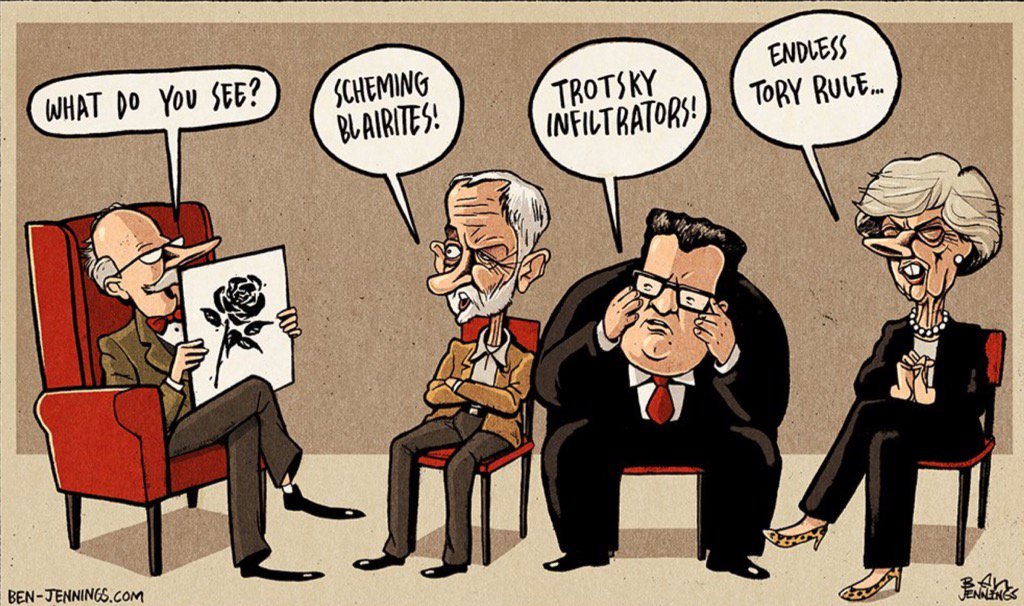
Geoffrey M. Hodgson
“This, from the always measured g. m. hodgson, shows Labour’s existential crisis in horrifying detail” – Susan Wilde
“The revolutionary road: excellent sober distillation of Marxism/Leninism/Trotskyism/socialism; rights v insurrection” – Rich Greenhill
“A very good summary of Labour and Trotskyism” – Gerry Hassan
“Another fantastic article!” – Lily Jayne Summers
John McDonnell, the Labour Shadow Chancellor, is an admirer of Trotsky. Corbyn once called upon the USSR to rehabilitate the Russian revolutionary.2
 Trotskyists are socialists who believe in the common ownership of the means of production. This goal was stated in Labour’s Clause Four from 1918 to 1995, so why shouldn’t Trotskyists be allowed to join Labour?
Trotskyists are socialists who believe in the common ownership of the means of production. This goal was stated in Labour’s Clause Four from 1918 to 1995, so why shouldn’t Trotskyists be allowed to join Labour?
Trotskyists differ from the devotees of Mao Zedong or Joseph Stalin. Trotskyists do not describe the murderous regimes of Mao’s China and the USSR as socialist. They promote themselves as anti-totalitarian, and they might seem much more democratic than other Marxists.
So why shouldn’t Trotskyists be allowed to join Labour?
The Parliamentary versus the Revolutionary Road
There is a prominent negative answer to this question. It raises profound differences of strategy. As Neil Kinnock (who did the party a great service by kicking out Militant in 1985) said in a speech to the Parliamentary Labour Party in July 2016:
‘In 1918 in the shadow of the Russian revolution [Labour members decided] … that they would not pursue the revolutionary road – it was a real choice in those days. They would pursue the parliamentary road to socialism.’
According to this view, Labour members and revolutionary Marxists share the same aim – socialism – but they differ on the method of getting there. Labour follows the parliamentary road; Marxists choose the revolutionary road.

Robert Owen
There are big problems with a part of this argument. Socialism was defined by Robert Owen and Karl Marx in terms of common ownership of the means of production and ‘the abolition of private property’.
But at least in practice since 1945, Labour has been less and less devoted to this goal. Finally, the goal of ‘common ownership’ was removed from Clause Four of the Labour Party Constitution in 1995.
Labour now says that it is a ‘democratic socialist’ party but defines this not in terms of common ownership. Instead there is a goal of social solidarity, believing ‘that by the strength of our common endeavour we achieve more than we achieve alone’, and in a society ‘in which power, wealth and opportunity are in the hands of the many not the few’.
Arguably, such a goal might be achievable in a reformed capitalism. But Trotskyists, like all Marxists, are emphatically against capitalism.
What Trotskyists and the post-1995 Labour Party Constitution mean by ‘socialism’ are very different. The divergences between Labour and Trotskyists concern different ends, as well as different means.
But Corbyn’s election as Leader by over 59 per cent of the membership in 2015 shows that the traditional definition and goal of socialism in the Labour Party is far from dead and buried. Under Corbyn’s leadership, Labour could return to its pre-1995 goals.

Tony Blair
Ironically, by getting rid of the traditional ‘common ownership’ version of socialism in 1995, but retaining the word ‘socialism’ in an attempt to invest it with a different meaning, Tony Blair provided legitimacy for any later attempt by classical socialists – including currently by Trotskyists and Corbynistas – to restore Labour to its original colours.
Within Labour today, because of this legacy, everyone from Trotskyists and Corbynistas at one extreme, through Owen Smith, Neil Kinnock and then on to Tony Blair at the other extreme, is obliged to call themselves a ‘socialist’. But there are massive silences and huge disagreements on its meaning.
Labour becomes less capable of discussing fundamental differences of goal, but clings onto the illusion of the fundamental goodness of something called ‘socialism’. Labour’s problem of entryism will never go away while the s-word continues to cast its spell. The word itself is an invitation for those who propose the common ownership of anything to join.
The Totalitarian Politics of Class Struggle
There are other fundamental problems with Marxism in general, and Trotskyism in particular. First, Marxism rejects the supreme values of the Enlightenment.
For example, Frederick Engels in Socialism: Utopian and Scientific, saw these Enlightenment values as ‘nothing more than the idealized kingdom of the bourgeoisie’ with its ‘bourgeois justice’, its ‘bourgeois equality before the law’ and ‘bourgeois property … proclaimed as one of the essential rights of man’.
 Marxists do not see the French Revolutionary principles of liberty, equality and fraternity as a potential achievement for all, but the rhetoric of the rising capitalist class in the class struggle against the old feudal order.
Marxists do not see the French Revolutionary principles of liberty, equality and fraternity as a potential achievement for all, but the rhetoric of the rising capitalist class in the class struggle against the old feudal order.
After playing their progressive historic role, Enlightenment ideas are seen as ‘bourgeois’ ideology, which now serves to repress the working class.
Marx saw socialism as the class destiny of the proletariat, which by overthrowing capitalism would emancipate humankind from inequality and exploitation. Socialism was not validated by an appeal to justice or rights. Instead it was grounded on ‘material’ and ‘economic’ developments within capitalism that were leading to growing internal crises and the rise of the proletariat.
Marx rejected all appeals to rights or justice. He bypassed the issues of morality and justice by focusing on the real social forces allegedly leading to socialism. But neither the driving forces of history nor the supposed destiny of a social class make this socialist future just, or morally right.

Karl Marx
By shelving the discourse on rights, in favour of the scientifically-clothed rhetoric of proletarian destiny, all versions of Marxism – including Trotskyism – are on the slippery slope toward totalitarianism.
When rights are no longer universal, and no-one has the protection of an independent legal system, the any action that is deemed ‘counter-revolutionary’ or ‘against the interests of the working class’ gives the accused no effective defence. The prosecutors monopolise the interpretation of guilt. Arbitrary punishment can follow.
The rights of critics and dissenters have to be protected, by their formal recognition and the autonomy of the judiciary. Unless this is done, any criticism can be crushed.
Trotsky was wrong: the roots of totalitarianism do not lie principally in the personalities of brutal, power-hungry individuals such as Stalin, but in Marxism itself. As Leszek Kolakowski suggested:
‘Marx’s anticipation of perfect unity of mankind and his mythology of the historically privileged proletarian consciousness … were responsible for his theory being eventually turned into an ideology of the totalitarian movement: not because he conceived of it in such terms, but because its basic values could hardly be materialized otherwise.’
Violence versus Parliament and Law
Laws get in the way of revolutionary struggle. Hence, along with their dilution of the notion of rights, Lenin proposed that all laws should be abolished.
 Writing in 1918, Lenin described the desired ‘dictatorship of the proletariat’ as ‘rule based directly upon force and unrestricted by any laws. The revolutionary dictatorship of the proletariat is rule won and maintained by the use of violence by the proletariat against the bourgeoisie, rule that is unrestricted by any laws.’ Trotsky supported Lenin in this and most other respects.
Writing in 1918, Lenin described the desired ‘dictatorship of the proletariat’ as ‘rule based directly upon force and unrestricted by any laws. The revolutionary dictatorship of the proletariat is rule won and maintained by the use of violence by the proletariat against the bourgeoisie, rule that is unrestricted by any laws.’ Trotsky supported Lenin in this and most other respects.
Consequently, a fundamental problem with Marxism is its failure to support the universality of human rights. Human rights apply to all, as in the majestic 1948 United Nations Declaration of Universal Human Rights.
Instead, Marxists see social advancement as a matter of ‘class struggle’ where one class must seize power and remove rights from another class. Lenin and Trotsky went one step further: they argued that this struggle for proletarian power must override the rule of law.
The Second Congress of the Communist International took place in Russia in 1920. Under the leadership of Lenin, one of its resolutions mentioned ‘bourgeois parliaments’ and declared:
‘The task of the proletariat consists in breaking up the bourgeois state machine, destroying it, and with it the parliamentary institutions, be they republican or constitutional monarchy.’
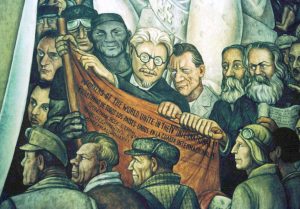 Throughout his life, Trotsky defended the decisions of the first four congresses of the Communist International, which took place when Lenin was alive and before Stalin seized power.
Throughout his life, Trotsky defended the decisions of the first four congresses of the Communist International, which took place when Lenin was alive and before Stalin seized power.
Trotsky added his own idea of ‘permanent revolution’, involving civil war, even in a parliamentary democracy:
‘Socialist construction is conceivable only on the foundation of the class struggle, on a national and international scale. This struggle … must inevitably lead to explosions, that is, internally to civil wars and externally to revolutionary wars. Therein lies the permanent character of the socialist revolution as such, regardless of whether it is a backward country … or an old capitalist country which already has behind it a long epoch of democracy and parliamentarism.’
Conclusion: Hands Tied Behind their Backs
Those in Labour wanting to fight the battle against entryism have two hands tied behind their backs.
 First, by hanging on to the word ‘socialism’, after abandoning its original meaning, it is difficult to exclude those who are more genuinely socialist in the classical sense of common ownership. Labour’s obligatory (but now shallow) rhetoric of ‘socialism’ is a green light for socialist entryists of all kinds.
First, by hanging on to the word ‘socialism’, after abandoning its original meaning, it is difficult to exclude those who are more genuinely socialist in the classical sense of common ownership. Labour’s obligatory (but now shallow) rhetoric of ‘socialism’ is a green light for socialist entryists of all kinds.
Second, Labour has long-ago ditched the politics of class struggle, but it retains a notion of class partisanship in its very name. It was formed historically to represent the interests of the working class. It was built upon the trade union movement. Labour itself is a class party.
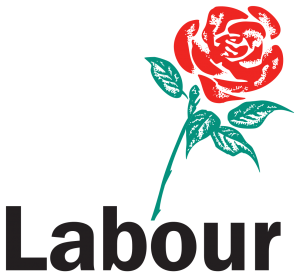 Of course, Labour in practice has put aside the notion that it is speaking for one section of society only. But its name remains a problem, both for broadening its appeal and for barring the more energetic and extreme exponents of working class representation and power.
Of course, Labour in practice has put aside the notion that it is speaking for one section of society only. But its name remains a problem, both for broadening its appeal and for barring the more energetic and extreme exponents of working class representation and power.
Of course, to achieve its goals, Labour is pledged to working through parliament, rather than through revolution. This is a very important difference. Many Marxists are still devoted to insurrection. Labour clearly is not. With this one big foot it can kick back. But its two hands are tied.
Labour still has much outdated baggage to deal with. Even if it staves off Trotskyist entryism – which now seems unlikely, at least while Corbyn is Labour Leader – it still will have a number of big problems. It will need to find and package a new identity for itself, which is suitable for the twenty-first century.
Retaining an unconvincing redefinition of ‘socialism’ and calling itself ‘Labour’ will not do.
Labour needs to come to terms with the fact that both classical socialism and class politics are untenable. It has to put democratic and progressive Enlightenment values at its centre, and reconfigure itself for the challenges of the twenty-first century.
16 August 2016
Minor edits: 17-18 August 2016
Endnotes
- Note that I refrain in this article from estimating the scale or impact of Trotskyist entryism in the Labour Party. They are not central to my argument here. For evidence of both (and of Corbyn’s links with the IRA) see here. At least currently, entryists into Labour are probably few in number, but it is a well-established fact that a few determined people can influence many thousands.
- In 2010, McDonnell attended an event commemorating the 70th anniversary of Trotsky’s assassination and has praised the ‘importance’ of his ideas (Riley-Smith 2016a). In 1988 Corbyn demanded from Parliament that the USSR should ‘give complete rehabilitation to Leon Trotsky’ (Riley-Smith, 2016b). Nothing wrong with that, but its shows the way he leans and who he chooses as friends.
- Personal note: I was a critical and wobbly Trotskyist from 1968 to 1973. I re-joined the Labour Party in 1974 and left it in 2001. The photograph below shows me (not then a Trot) visiting Trotsky’s house in Mexico in 1981, where he was murdered in 1940. It is a moving and impressive place.

References
Crick, Michael (2016) Militant (London: Biteback Publishing), esp. pp. xvii–xviii.
Kolakowski, Leszek (1977) ‘Marxist Roots of Stalinism’, in Robert C. Tucker (ed.) (1977) Stalinism: Essays in Historical Interpretation (New York: Norton), pp. 283-98.
Lenin, Vladimir Ilyich (1967) Selected Works in Three Volumes (London: Lawrence and Wishart), esp. vol. 3, p. 49.
Marx, Karl and Engels, Frederick (1962) Selected Works in Two Volumes (London: Lawrence and Wishart), esp. vol. 2, p. 117.
New Park Publications (1977) The Second Congress of the Communist International, 2 vols (London: New Park), esp. vol. 2, p. 52.
Riley-Smith, Ben (2016a) ‘Labour Entryism Row: John McDonnell Attended Celebration of Leon Trotsky and Praised ‘Importance’ of his Ideas’, The Telegraph, 14 August. http://www.telegraph.co.uk/news/2016/08/14/labour-entryism-row-john-mcdonnell-attended-celebration-of-leon/.
Riley-Smith, Ben (2016b) ‘Jeremy Corbyn Called for a “Complete Rehabilitation” of Leon Trotsky in Parliament’, The Telegraph, 16 August. http://www.telegraph.co.uk/news/2016/08/15/jeremy-corbyn-called-for-complete-rehabilitation-of-leon-trotsky/
Sparrow, Andrew and Jones, Harrison (2016) ‘Secret Recording of Kinnock’s anti-Corbyn Speech to MPs – In Full’, The Guardian, 6 July. http://www.theguardian.com/politics/2016/jul/08/secret-recording-neil-kinnock-jeremy-corbyn-step-down-speech-to-mps-in-full.
Trotsky, Leon D. (1962) The Permanent Revolution and Results and Prospects (London: New Park), esp. ch. 10.
Watson, Tom (2016) ‘Tom Watson Sends Corbyn “Proof of Trotskyist Labour Infiltration”’, The Guardian, 10 August. http://www.theguardian.com/politics/2016/aug/10/tom-watson-sends-corbyn-proof-of-trotskyist-labour-infiltration
Posted in Common ownership, Democracy, Jeremy Corbyn, Labour Party, Left politics, Liberalism, Nationalization, Robert Owen, Socialism, Tony Benn, Tony Blair, Uncategorized
July 30th, 2016 by geoffhodgson1946
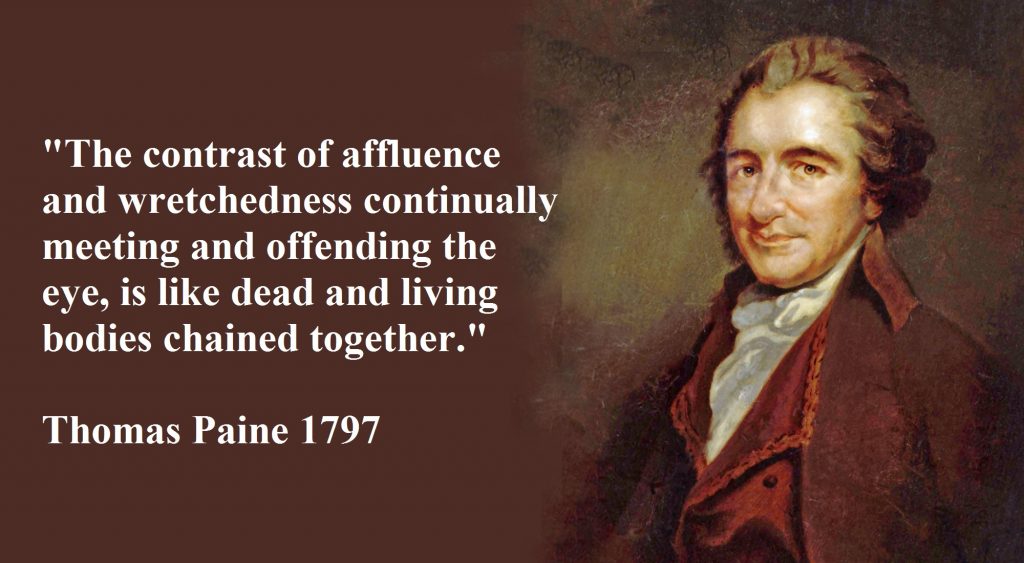
Geoffrey M. Hodgson
Once upon a time, all socialists saw the ‘common ownership of the means of production, distribution and exchange’ as their primary aim. Many die-hards still do.
Others now focus instead on reducing inequalities of power, wealth and income. Some past or present contenders for leadership of the UK Labour Party, including Yvette Cooper and Owen Smith, have argued that the party’s aims in Clause Four of its constitution, should be rewritten to give greater emphasis to equality.
Smith has gone even further, to declare that Labour should focus on ‘equality of outcomes’ and not simply equality of opportunity. He proposed a wealth tax and an increase of the top rate of income tax to 50 per cent. Jeremy Corbyn’s leadership team claimed that they had already adopted these policies.
 Given the huge and growing inequalities within modern capitalism, this focus on inequality is a positive move. But concern about inequality has never been confined to socialism. Ritual incantation of the aim for a ‘socialist’ future within the Labour Party may divert attention from measures that can be implemented within capitalism and without widespread common ownership.
Given the huge and growing inequalities within modern capitalism, this focus on inequality is a positive move. But concern about inequality has never been confined to socialism. Ritual incantation of the aim for a ‘socialist’ future within the Labour Party may divert attention from measures that can be implemented within capitalism and without widespread common ownership.
We also need to look at the basic drivers of inequality within capitalism. We must consider what can be done, within this system, and short of some mythical socialist future.
The practicalities of trying to reduce inequality within capitalism have to be addressed. If higher taxes are part of the solution, then somehow, in a democracy, people have to be persuaded to adopt them. Additional measures to help reduce inequality should be devised.
Furthermore, talk of ‘equality of outcomes’ is ill-advised. Are we really going to give everyone the same income and wealth, thus removing incentives for creativity and hard work? Is the communist utopia – ‘from each according to his ability, to each according to his need’ – practical, or even desirable?
The aim should be to dramatically reduce inequality, not to eliminate it. Incentives for hard work and enterprise should be retained.
Shifting the focus from common ownership to the reduction of inequality is an important step forward. But the analysis of causes, and the design of policy, have to be much more sophisticated.
The problem of inequality
At least nominally, capitalism embodies and sustains an Enlightenment agenda of freedom and equality. Typically there is freedom to trade and equality under the law, meaning that most adults – rich or poor – are formally subject to the same legal rules. But with its inequalities of power and wealth, capitalism darkens this legal equivalence.
Richard Wilkinson and Kate Pickett showed multiple deleterious effects of inequalities of income and wealth. Using data from twenty-three developed countries and from the separate states of the United States, they observed negative correlations between inequality, on the one hand, and physical health, mental health, education, child well-being, social mobility, trust and community life, on the other hand. They also found positive correlations between inequality and drug abuse, imprisonment, obesity, violence, and teenage pregnancies. They suggested that inequality creates adverse outcomes through psycho-social stresses generated through interactions in an unequal society.
 Although economic inequality is endemic to capitalism, data gathered by Thomas Piketty in his Capital in the Twentieth Century, and by me in my book entitled Conceptualizing Capitalism, show that there are large variations in measures of inequality in different major capitalist countries, and through time. The existence of such variety within capitalism suggests that it possible to alleviate inequality, to a significant degree, within capitalism itself.
Although economic inequality is endemic to capitalism, data gathered by Thomas Piketty in his Capital in the Twentieth Century, and by me in my book entitled Conceptualizing Capitalism, show that there are large variations in measures of inequality in different major capitalist countries, and through time. The existence of such variety within capitalism suggests that it possible to alleviate inequality, to a significant degree, within capitalism itself.
But first we must be clear about the drivers of inequality within the system. What are the mechanisms within capitalism that exacerbate inequalities of income or wealth?
Some inequality results from individual differences in talent or skill. But this cannot explain the huge gaps between rich and poor in many capitalist countries. Much of the inequality of wealth found within capitalist societies results from inequalities of inheritance. The process is cumulative: inequalities of wealth often lead to differences in education, economic power, and further inequalities in income.
Do markets create inequality?
To what extent can inequalities of income or wealth be attributed to the fundamental institutions of capitalism, rather than a residual landed aristocracy, or other surviving elites from the pre-capitalist past? A familiar mantra is that markets are the source of inequality under capitalism. Can markets be blamed for inequality?
In real-world markets different sellers or buyers vary hugely in their capacities to influence prices and other outcomes. When a seller has sufficient saleable assets to affect market prices, then strategic market behaviour is possible to drive out competitors.
Would more competition, with greater numbers of market participants, fix this problem? If markets per se are to be blamed for inequality, then it has to be shown that competitive markets also have this outcome. Unless we can demonstrate their culpability, blaming competitive markets for inequalities of success or failure might be like blaming the water for drowning a weak swimmer.
To demonstrate that competitive markets are a source of inequality we would have to start from an imagined world where there was initial equality in the distribution of income and wealth, and then show how markets led to inequality. I know of no such theoretical explanation.
Markets involve voluntary exchange, where both parties to an exchange expect benefits. One party to the exchange may benefit more than the other; but there is no reason to assume that individuals who benefit more, or benefit less (in one exchange) will generally do so. And if some traders become more powerful in the market than others, then its competitiveness is reduced.
The sources of inequality within capitalism
So if markets per se are not the root cause of inequality under capitalism, then what is? A clear answer to this question is vital if effective policies to counter inequality are to be developed. Capitalism builds on historically-inherited inequalities of class, ethnicity, and gender. By affording more opportunities for the generation of profits, it may also exaggerate differences due to location or ability. Partly through the operation of markets, it can also enhance positive feedbacks that further magnify these differences. But its core sources of inequality lie elsewhere.
 Because waged employees are not slaves, they cannot use their lifetime capacity for work as collateral to obtain money loans. The very commercial freedom of workers denies them the possibility to use their labour assets or skills as collateral.
Because waged employees are not slaves, they cannot use their lifetime capacity for work as collateral to obtain money loans. The very commercial freedom of workers denies them the possibility to use their labour assets or skills as collateral.
By contrast, capitalists may use their property to make profits, and as collateral to borrow money, invest and make still more money. Differences become cumulative, between those with and without collateralizable assets, and between different amounts of collateralizable wealth. Even when workers become home-owners with mortgages, the wealthier can still race ahead.
Unlike owned capital, free labour power cannot be used as collateral to obtain loans for investment. At least in this respect, capital and labour do not meet on a level playing field, this asymmetry is a major driver of inequality.
The foremost generator of inequality under capitalism is not markets but capital. This may sound Marxist, but it is not. I define capital differently from Marx and from most other economists and sociologists. My definition of capital corresponds to its enduring and commonplace business meaning. (Piketty’s definition is also similar to mine.) Capital is money, or the realizable money-value of collateralizable property. Unlike labour, capital can be used as collateral and the loan obtained can help generate further wealth.
Because workers are free to change jobs, employers have diminished incentives to invest in the skills of their workforce. Especially as capitalism becomes more knowledge-intensive, this can create an unskilled and low-paid underclass and further exacerbate inequality, unless compensatory measures are put in place. A socially-excluded underclass is observable in several developed capitalist countries.
Another source of inequality results from the inseparability of the worker from the work itself. By contrast, the owners of other factors of production are free to trade and seek other opportunities while their property makes money or yields other rewards. This puts workers at a disadvantage. Through positive feedbacks, even slight disadvantages can have cumulative effects.
None of these core drivers of inequality can be diminished by extending markets or increasing competition. These drivers are congenital to capitalism and its system of wage labour. If capitalism is to be retained, then the compensatory arrangements that are needed to counter inequality cannot simply be extensions of markets or private property rights.
These ineradicable asymmetries between labour and capital mean that ultra-individualist arguments against trade unions are misconceived. In a system that is biased against them, workers have a right to organize and defend their rights, even if it reduces competition in labour markets.
The relevance of Thomas Paine
Contrary to a widespread myth, Thomas Paine (1737-1809) was a liberal rather than a socialist. There is no support for common ownership in his writings. Instead he support private enterprise and a market economy.
But over two hundred years ago, he set out arguments and methods for reducing inequality. Paine recognised that ownership of property was vital, to provide incentives for the generation of wealth and to provide a means for its fairer distribution.
Paine argued for an inheritance tax, but balanced this by a grant to each adult at reaching the age of maturity. In this way, wealth would be recycled from the dead to the young, providing greater equality of opportunity across the board. Paine also advocated welfare provision and a guaranteed pension for those over 50.
Much of the wealth in Paine’s time was in land. Land and buildings are immobile, and can be readily assessed and taxed. But capital is fleet-footed and covert: it can be easily moved around the world or hidden in foreign accounts. Land ownership is still highly concentrated in a few hands, along with much additional wealth.
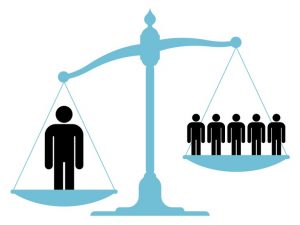 Today we face problems of inequality even greater than those addressed by Paine. In the USA, the richest 1 per cent own 34 per cent of the wealth and the richest 10 per cent own 74 per cent of the wealth. In the UK, the richest 1 per cent own 12 per cent of the wealth and the richest 10 per cent own 44 per cent of the wealth. In France the figures are 24 cent and 62 per cent respectively. The richest 1 percent own 35 percent of the wealth in Switzerland, 24 per cent in Sweden and 15 percent in Canada.
Today we face problems of inequality even greater than those addressed by Paine. In the USA, the richest 1 per cent own 34 per cent of the wealth and the richest 10 per cent own 74 per cent of the wealth. In the UK, the richest 1 per cent own 12 per cent of the wealth and the richest 10 per cent own 44 per cent of the wealth. In France the figures are 24 cent and 62 per cent respectively. The richest 1 percent own 35 percent of the wealth in Switzerland, 24 per cent in Sweden and 15 percent in Canada.
Although there are important variations, other developed countries show similar patterns of inequality within this range. The problem is extreme in the USA. Lower levels of inequality elsewhere are far from satisfactory, but they indicate what might be politically feasible for the currently more unequal countries.
Spreading property
Bruce Ackerman and Anne Alstott took up Paine’s agenda in their proposal for a ‘stakeholder society.’ They argued that ‘property is so important to the free development of individual personality that everybody ought to have some’. They echoed Francis Bacon: ‘Wealth is like muck. It is not good but if it be spread.’
 To this end, home ownership is of positive value, as a means of widely extending ownership of collateralizable property. But there also needs to be a substantial amount of social housing available for rent, to cater for those unable to afford to buy their own homes.
To this end, home ownership is of positive value, as a means of widely extending ownership of collateralizable property. But there also needs to be a substantial amount of social housing available for rent, to cater for those unable to afford to buy their own homes.
Significantly, the Right has promoted home ownership, while it has often been rebutted by the Left. This resistance comes from the Left’s old-fashioned, over-extended collectivism. By contrast, it is important for the Left to champion home ownership within an egalitarian and redistributive political programme.
When Margaret Thatcher introduced the ‘right to buy’ for tenants in social housing in 1980, Labour responded in its 1983 General Election Manifesto with a pledge to reverse these sales. But by 1985 Labour had abandoned this position.
Recycling wealth across generations
Ackerman and Alstott stressed progressive taxes on wealth rather than on income. Echoing Paine, they proposed a large cash grant to all citizens when they reach the age of majority, around the benchmark cost of taking a bachelor’s degree at private university in the United States. This grant would be repaid into the national treasury at death. To further advance redistribution, they argued for the gradual implementation of an annual wealth tax of two percent on a person’s net worth above a threshold of $80,000. Like Paine, they argued that every citizen has the right to share in the wealth accumulated by preceding generations. A redistribution of wealth, they proposed, would bolster the sense of community and common citizenship.
 Increased wealth or inheritance taxes are likely to be unpopular because they are perceived as an attack on the wealth that we have built up and wish to pass on to our children or others of our choice. But the brilliance of Paine’s 1797 proposal for a cash grant at the age of majority is that it offers a quid-pro-quo for wealth or inheritance taxes at later life.
Increased wealth or inheritance taxes are likely to be unpopular because they are perceived as an attack on the wealth that we have built up and wish to pass on to our children or others of our choice. But the brilliance of Paine’s 1797 proposal for a cash grant at the age of majority is that it offers a quid-pro-quo for wealth or inheritance taxes at later life.
People will be more ready to accept wealth taxation if they have earlier benefitted from a large cash grant in their youth. Wealth would by recycled to younger generations rather than syphoned away. The more fortunate or successful can be persuaded to give up some of their advantages if they see the benefits for society as a whole.
A related proposal, also redolent of Paine, was launched by the British Labour Government in 2005. It introduced a Child Trust Fund with the aim of ensuring every child has savings at the age of 18, giving every child a financial boost that they could use for the purposes of education or enterprise. Children received an initial £250 subscription from the government. Family and friends could top up these trust funds. The child would attain control of the fund at age 18. Withdrawals could then be made but be exempt from taxation. A weakness of this particular scheme was its timidity. A greater government subscription would have been more redistributive and egalitarian in its consequences. Child Trust Funds were opposed by the Conservatives and the Liberal Democrats, and abolished after they came to power in a coalition in 2010.
Extending education and share ownership
In the economy, there are many ways of spreading power and influence more broadly. The idea of extending employee shareholding is growing in popularity. This is a flexible strategy for extending ownership of revenue-producing assets in society. In the USA alone, over ten thousand enterprises, employing over ten million workers, are part of employee-ownership, stock bonus, or profit-sharing schemes. Employee ownership can increase incentives, personal identification with the enterprise, and job satisfaction for workers. The evidence suggests that when employee-ownership schemes and some employee participation in decision-making are combined, greater increases in profitability and productivity can be obtained.
As modern capitalist economies become more knowledge-intensive, access to education to develop skills becomes all the more important. Those deprived of such education suffer a degree of social exclusion, and, unless it is addressed, this problem is likely to get worse. Widespread skill-development policies are needed, alongside integrated measures to deal with job displacement and unemployment.
A universal basic income
The need for ongoing education is one argument for a basic income guarantee. Such a basic income would be paid to everyone out of state funds, irrespective of other income or wealth, and whether the individual is working or not. It is justified on the grounds that individuals require a minimum income to function as free and choosing agents. The basic means of survival are necessary to make use of our liberty, to have some autonomy, to function as effective citizens, to develop ethically, and to participate in civil society. These are conditions of adequate and educated inclusion in the market world of choice and trade.
A basic income would also reward otherwise unpaid work in care for the sick or elderly, which is often performed within families. A basic income would also encourage new entrepreneurs and creative artists. There would also be a huge saving in administration costs of often complex social security and welfare schemes. The level of the basic income does not have to be high. It can be set as a basic minimum for survival, thus retaining strong incentives for most people to seek additional sources of income.
Some forms of unconditional basic income have been pledged or introduced in several countries, including Brazil and Finland. Several developed countries have legal minimum income entitlements. In 1968, James Tobin, Paul A. Samuelson, John Kenneth Galbraith, and another twelve hundred economists signed a document calling for the US Congress to introduce a system of income guarantees and supplements. Winners of the Nobel Prize in Economics who fully support a basic income include Milton Friedman, Friedrich Hayek, James Meade, Herbert Simon, and Robert Solow. Significantly, this idea cuts across the political spectrum.
Conclusion
A key challenge for modern capitalist societies, alongside the needs to protect the natural environment and enhance the quality of life, is to retain the dynamic of innovation and investment while ensuring that the rewards of the global system are not returned largely to the richer owners of capital. As Paine put it in 1797:
All accumulation, therefore, of personal property, beyond what a man’s own hands produce, is derived to him by living in society; and he owes on every principle of justice, of gratitude, and of civilization, a part of that accumulation from whence the whole came.
But the benefits of ‘living in society’ are not simply through the advantages of cooperation or the division of labour. Modern societies have developed complex institutions that have empowered innovations and massive expansions of wealth. The ultimate and indivisible accumulation is not simply of things, but of knowledge, relations and rules, guarded by law within an adaptable and pluralist polity.
We need to update Paine’s approach to dealing with inequality, to suit modern times.
30 July 2016
Edited 31 July 2016
|
My forthcoming book elaborates on some of the political issues raised in this blog:
Wrong Turnings: How the Left Got Lost
To be published by University of Chicago Press in November 2017
|
Bibliography
Ackerman, Bruce and Alstott, Anne (1999) The Stakeholder Society (New Haven, CT: Yale University Press).
Atkinson, Anthony B. (2015) Inequality: What Can Be Done? (Cambridge MA: Harvard University Press).
Bowles, Samuel and Gintis, Herbert (1999) Recasting Egalitarianism: New Rules for Markets, States, and Communities (London: Verso).
Bowles, Samuel and Gintis, Herbert (2002) ‘The Inheritance of Inequality’, Journal of Economic Perspectives, 16(3), Summer, pp. 3-30.
Claeys, Gregory (1989) Thomas Paine: Social and Political Thought (London and New York: Routledge).
Credit Suisse Research Institute (2012) Credit Suisse Global Wealth Databook 2012 (Zurich: Credit Suisse Research Institute).
Hodgson, Geoffrey M. (2015) Conceptualizing Capitalism: Institutions, Evolution, Future (Chicago: University of Chicago Press).
Paine, Thomas (1797) Agrarian Justice: Opposed to Agrarian Law and to Agrarian Monopoly (Philadelphia: Folwell).
Paine, Thomas (1945) The Complete Writings of Thomas Paine, edited and introduced by Philip S. Foner (New York: Citadel Press).
Piketty, Thomas (2014) Capital in the Twenty-First Century (Cambridge, MA: Belknap Press).
Robinson, Andrew M. and Zhang, Hao (2005) ‘Employee Share Ownership: Safeguarding Investments in Human Capital’, British Journal of Industrial Relations, 43(3), September, pp. 469-88.
Wilkinson, Richard and Pickett, Kate (2009) The Spirit Level: Why More Equal Societies Almost Always Do Better (London: Allen Lane).
Posted in Common ownership, Jeremy Corbyn, Labour Party, Left politics, Liberalism, Markets, Nationalization, Politics, Private enterprise, Right politics, Socialism, Uncategorized
July 23rd, 2016 by geoffhodgson1946

A Worker Cooperative in New York City
Geoffrey M. Hodgson
‘The question we ask today is not whether our government is too big or too small, but whether it works … Nor is the question before us whether the market is a force for good or ill. Its power to generate wealth and expand freedom is unmatched.’
Barack Obama, 2009.
Politicians engage in slogans and sound-bites, but sometimes they reveal their true aims.
The Labour Party is now immersed in a battle for its leadership, and possibly for its survival as a viable political party. Jeremy Corbyn, overwhelmingly elected as leader in 2015 by about sixty per cent of the party membership, has lost the confidence of about eighty per cent of the party’s MPs.

Owen Smith
Owen Smith, Corbyn’s challenger for the Labour leadership, once worked for the private, research-based, pharmaceutical company Pfizer. In response, Corbyn and his allies have been quick to condemn Smith’s association with private enterprise.
Corbyn has always been a supporter of the original version of Labour’s Clause Four, with its aim of ‘common ownership of the means of production, distribution and exchange’. But since he became Labour Leader, he has kept this long-term aim mostly under wraps, highlighting his opposition to austerity economics instead.
However, on 21 July 2016, we had a brief peep under the tarpaulin, showing us Corbyn’s real aims.
Corbyn’s opposition to privately-funded pharmaceutical research
 The Association of the British Pharmaceutical Industry (ABPI) – the trade association for over 120 UK companies producing prescription medicines – quickly responded with a statement questioning Corbyn’s judgement in this area.
The Association of the British Pharmaceutical Industry (ABPI) – the trade association for over 120 UK companies producing prescription medicines – quickly responded with a statement questioning Corbyn’s judgement in this area.
The ABPI pointed out that the pharmaceutical industry invests more than £88bn a year into research and development for new medicines and vaccines to help fight disease. In the UK this equates to £4.1bn per year of investment in R&D, with the Medical Research Council contributing £770m and research charities £1.3bn.
The pharmaceutical industry is global, and it is difficult to see how the taxpayer-funded UK Medical Research Council could take over the roles of the large private players in this sphere, unless this research was dramatically diminished. As the ABPI pointed out, research in this area has to be a collaboration between industry researchers, academics and clinicians, involving both public and private institutions.
Many successes in the development of drug treatments – including for breast cancer and HIV – have involved collaborations between research-oriented universities, risk-taking companies, concerned charities, government agencies, and so on. Typically these collaborations involve complex synergies and are international in scope.
Corbyn’s proposal that modern levels of pharmaceutical research should be publicly rather than privately funded – within one country – is feasible in neither budgetary nor practical terms.2
But further, in his zeal for the public takeover of research and development, Corbyn has failed to learn one of the crucial economic lessons of the twentieth century, concerning the limitations of largely publicly-owned R&D and need more broadly for a healthy, innovative, private sector.
This lesson is sketched out later below. It concerns the vital role of different forms of private enterprise – from corporations to worker cooperatives, which all have legal autonomy and they sell their products on a market. But first we emphasise that the essential role of the state and the public sector.
The state and the public sector are vital
We should also understand the vital role of the public sector in modern capitalist economists, including in the sphere of research. Numerous authors, including Richard Nelson, Ha-Joon Chang, Erik Reinert, Mariana Mazzucato and myself, have argued that – for several reasons – the state plays an essential, supportive role within modern capitalism.
 In practical terms, evidence shows that the most successful economies are those that involve a collaboration of public and private institutions, including for research, development and innovation.
In practical terms, evidence shows that the most successful economies are those that involve a collaboration of public and private institutions, including for research, development and innovation.
For example, the modern patent system is backed up by legal and state powers that protect innovations from plagiarism and provide incentives for private research and creativity. It is an example of the way in which the state can maintain institutions that encourage private research.
There are areas where private enterprise works best, and there are areas where the public sector can be usefully involved. Determining these best areas in each case, is a practical question, involving detailed, complex, ongoing, empirical examination and experimentation.
Instead, Corbyn resorts to ideology, with this prescription: public ownership works best, and even when in doubt, nationalize. This is the mirror image of free-market ideologists, who stipulate: markets work best, and even when in doubt, privatize.
A simplistic ideological debate between private and public ownership dominated the twentieth century. The ‘common ownership’ version of Labour’s Clause Four, which lasted from 1918 to 1995, expressed one side in the debate. Margaret Thatcher and Ronald Reagan, among many others, took the other side.
A key lesson of the twentieth century is that the dichotomy between public and private provision is misleading. The key question is how they can be usefully combined. Within any useful combination, both private and public enterprise have a crucial role to play. This essay explains why a private sector is vital.
My recent book entitled Conceptualizing Capitalism explains why the role of the state is also crucial, even to sustain the institutions that make private enterprise work. But here I concentrate on the case for private enterprise.
The failure of centrally-planned innovation
Any vision of a large-scale planned economy involves assembling information in local or national agencies, and then making decisions based on this information. Proposed innovations and other changes must be appraised, and decisions on their viability must be made.
In their schemes to bring all knowledge together into the hands of planners, advocates of comprehensive planning overlook the time and other difficulties involved in gathering and dealing with available information. Also they give inadequate consideration to how innovations are to be incentivized, tested and promoted.
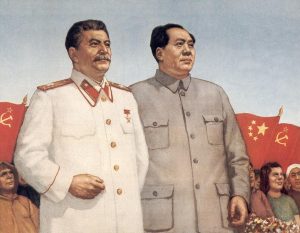 Innovation depends on hunches about the future. Successful innovation takes into account local, tacit and other knowledge concerning circumstances and possibilities. Much of this knowledge involves complex details and contexts, and cannot all be brought together and utilized by a central committee or planning authority.
Innovation depends on hunches about the future. Successful innovation takes into account local, tacit and other knowledge concerning circumstances and possibilities. Much of this knowledge involves complex details and contexts, and cannot all be brought together and utilized by a central committee or planning authority.
Because of diminished competitive pressures, nationalized industries in centrally planned economies, such as the Soviet Union and Mao’s China, have been unimpressive in terms of innovation and flexibility. Why should a committee back innovation or change, especially when it carries risks of failure? Why should they risk their jobs when they have no secure right of additional reward in the case of success?
The economist Peter Murrell showed empirically that the former Communist countries were apparently no less efficient in allocating resources than capitalist economies. Where they lagged was in terms of dynamic efficiency: the ability to innovate. This shortfall is endemic to any system that works on the basis of hierarchical planning, rather than independent enterprise with legal rights to reap and retain rewards.
Whatever the limitations of a market system, it has the advantage that it does not require majority agreement before a decision can be made to produce or distribute a good or service. Private property and contracts permit zones of autonomy within an interrelated system; agents may reach decisions through negotiated contracts with others. The costs and benefits are devolved to individuals or firms.
Through private enterprise it is possible for many technological or institutional innovations to be pioneered without the prior agreement of (democratic) committees or (undemocratic) bureaucrats. This analysis is borne out by experience. The former Soviet-type economies in Russia and China lacked devolved autonomy, secured by private ownership.
Eventually they learned that lesson. The change in China was most dramatic. After the Communist Revolution of 1949, agriculture in China was organized into large collective farms. Other than by threats and bureaucratic bullying, farmers had little incentive to improve productivity. Risky innovation was unwise. Productivity remained low and often there were shortages of food. But Mao Zedong died in 1976, opening up the possibility of reform.
 In 1978 some Chinese peasant farmers decided to withdraw from collective farms and take responsibility for production at the household level, where the household (instead of the collective) received the revenue from its sold output. Individual households had much greater incentives to work harder and to innovate. After decades of slow growth under Mao, China’s explosive economic growth began with those changes in rural areas. As a result, unprecedented millions were lifted out of poverty.
In 1978 some Chinese peasant farmers decided to withdraw from collective farms and take responsibility for production at the household level, where the household (instead of the collective) received the revenue from its sold output. Individual households had much greater incentives to work harder and to innovate. After decades of slow growth under Mao, China’s explosive economic growth began with those changes in rural areas. As a result, unprecedented millions were lifted out of poverty.
China’s spectacular economic growth began when agriculture began to pass into the private control of the peasants after 1978. The Chinese Communist Party endorsed these changes in the rights to use and manage land (while keeping legal title to the land in the hands of the collectives), and also promoted private businesses in rural areas.
China also retained many state-owned enterprises. The state continued to play a major strategic role in economic development. China has demonstrated how viable public and private sectors are essential for growth and innovation in a modern large-scale economy.
The failure of classic socialism
Some version of socialism might work on a small scale. Cooperation can work in this context, based on close, inter-personal interactions. Humans have co-operated in this way, in families and tribal groups, for many thousands of years.

Elinor Ostrom
Nobel Laureate Elinor Ostrom studied the management of common-pool resources – such as medieval common land, fisheries or agricultural irrigation schemes – and showed how they can be effectively managed by relatively small local communities.
Their small size allows participants to monitor each other, to ensure that necessary tasks are carried out and that the interests of the community are served.
Enforcement mechanisms range from praise to punishment. Within these relatively small and cohesive groups, trust and targeted sanctions are mechanisms for encouraging cooperation, reciprocity and compliance with customary rules.
But socialism on a small scale would lack the economies of large-scale production and the technological dynamism of today’s competitive capitalism. Modern medicines and technologically-advanced treatments, requiring extensive funding, risk-taking and research collaboration, could not be developed. With inferior drugs and healthcare, human longevity would be lower than it is today.
In larger socialist societies, individual incentives for effort and innovation are diminished, and compensatory, face-to-face, trust-based mechanisms to sustain cooperation are relatively less effective. When we move from communities of a hundred or so, where it is possible for everyone to know everyone else, to communities of thousands or more, then interpersonal trust and reputation are much less effective at the overall level, and they have to be supplement both other incentives and constraints.
When thousands of people are brought together, and rewards are shared, then there is less incentive to make the extra effort, because the rewards from that additional work would be hugely diluted.
Large private corporations face this problem too. But competitive pressure on the private corporation obliges it to incentivise its workforce in some way, so that most employees pull their weight.
Market competition is absent or much diminished in a centrally planned economy. Instead, the pressure to perform comes from the state. Consequently, strong discipline is necessary to sustain production, and larger-scale socialism engenders authoritarianism and bureaucracy. Twentieth-century evidence strongly supports this analysis.
Those that propose ‘democratic socialism’ in large-scale societies fail to address some key practical questions. How is all the important information to be gathered and transmitted? How are resources to be produced and distributed? How is everyone to be incentivized to work well and to innovate? And if the system is to be ‘democratic’, how would it be possible for everyone involved to vote on every important decision?

Robert Owen
Such practical considerations show that democratic socialism (at least in the classic sense of Robert Owen and Karl Marx, who proposed common ownership and the abolition of private enterprise) is unfeasible in any large-scale complex economy.
While interpersonal interactions can engender cooperation on a small scale, in large-scale societies other mechanisms and incentives are necessary. For dynamism and efficiency, there have to be competition, markets and a large private sector, as well as a state.
Private ownership is also important for political reasons, to create zones of politico-economic power that can countervail state autocracy.
Contrary to the twin, all-or-nothing, ideologies of classical socialism and free-market purism, this leaves open a huge area for economic reform and development. A private sector can be made up of many different kinds of enterprise, including worker cooperatives and social enterprises, as well as more conventional corporations. The state can intervene in a myriad of ways, including the adoption of redistributive taxation and the development of a strong welfare state.
Once all this is understood, then the game changes – irrevocably. Once it is realized that classical socialism cannot work (at least in a humane way) then you have to look for alternatives. Once it is acknowledged that private property and markets are indispensable in large-scale modern economies, then you have to accept them, warts and all. The best that can be done is to minimize their deleterious effects, and to explore viable avenues of institutional reform.
Much of the Labour Party learned this lesson in the era from 1945 to 2015. It adjusted to the mixed economy and began to understand the virtues and indispensability of private enterprise. That lesson seems to be forgotten by a large number of Labour Party members, who continue to support Corbyn and his naïve, outdated ideology. Unless that lesson is learned again, and quickly, then Labour has no future as an electable political party.
23 July 2016
Edited 24 July 2016
|
My forthcoming book elaborates on some of the political issues raised in this blog:
Wrong Turnings: How the Left Got Lost
To be published by University of Chicago Press in November 2017
|
-
Corbyn added that he was in favour of a National Health Service that is ‘totally public’ with ‘publicly employed people running it’. Is he aware that GPs are not NHS employees but self-employed contractors? If so, is it his intention to make all GPs employees?
-
In an interview on 24 July 2016, Corbyn’s ally John McDonnell backtracked on his leader’s statement, re-admitting a role for private sector pharmaceutical research under some vague notion of ‘democratic control’. He said that Corbyn’s statement had been ‘misinterpreted’. But this dishonest manoeuvring under pressure fails to mask their true aims.
Bibliography
Chang, Ha-Joon (2002) Kicking Away the Ladder: Development Strategy in Historical Perspective (Anthem Press: London).
Hayek, Friedrich A. (1944) The Road to Serfdom (London: George Routledge).
Mazzucato, Mariana (2013) The Entrepreneurial State: Debunking Public vs. Private Sector Myths (London and New York: Anthem).
Murrell, Peter (1991) ‘Can Neoclassical Economics Underpin the Reform of Centrally Planned Economies?’ Journal of Economic Perspectives, 5(4), Fall, pp. 59-76.
Nelson, Richard R. (1981) ‘Assessing Private Enterprise: An Exegesis of Tangled Doctrine’, Bell Journal of Economics, 12(1), pp. 93-111.
Nelson, Richard R. (2003) ‘On the Complexities and Limits of Market Organization’, Review of International Political Economy, 10(4), November, pp. 697-710.
Ostrom, Elinor (1990) Governing the Commons: The Evolution of Institutions for Collective Action (Cambridge: Cambridge University Press).
Reinert, Erik S. (2007) How Rich Countries Got Rich … And Why Poor Countries Stay Poor (London: Constable).
Zhou, Kate Xiao (1996) How the Farmers Changed China (Boulder, CO: Westview Press)
Posted in Common ownership, Jeremy Corbyn, Labour Party, Left politics, Liberalism, Markets, Nationalization, Politics, Private enterprise, Right politics, Robert Owen, Socialism, Uncategorized
June 30th, 2016 by geoffhodgson1946
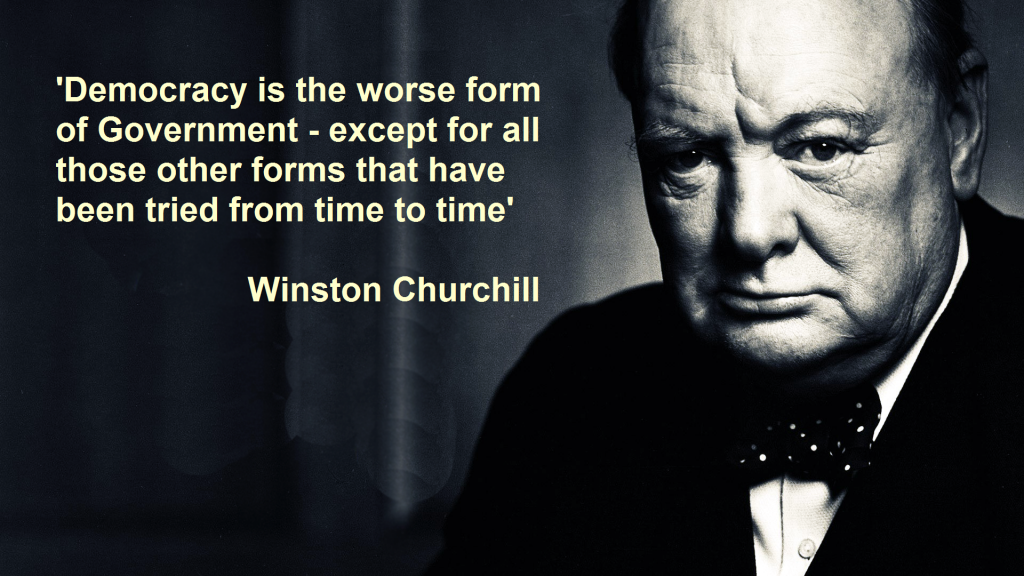
Geoffrey M. Hodgson
UK politics is currently in turmoil, as a result of the vote for Brexit on 23 June 2016. Should a narrow referendum result be implemented by the government, or should Parliament alone make the final decision? The constitutional position is that Parliament is sovereign. But many insist that even a narrow result should automatically be respected. To do anything else would be ‘undemocratic’ – and therefore wrong.
Within days of the referendum, the Parliamentary Labour Party passed a decisive vote of no confidence in Jeremy Corbyn as its leader.

Jeremy Corbyn
Corbyn is a ‘democratic socialist’, believing in a large public sector under some form of ‘democratic control’. His speeches and writings are silent on the detail on how this would work. We find a tiny bit more in the publications of his late mentor – Tony Benn. Benn argued that the essence of socialism was democracy, not simply in parliament, but in the economy and all civic life.
This is not a new idea. Vladimir Lenin wrote in 1917 in his State and Revolution of ‘an immense expansion of democracy’ (which of course was the reverse of what actually happened after he seized power).
G. D. H. Cole was a Fabian and Labour Party socialist. His vision of ‘guild socialism’ was of an integrated, national system where ‘a single authority is responsible both for the planning of the social production as a whole and for the distribution of the incomes which will be used in buying it.’ Within this ‘single authority’ he also sought devolved worker control, where groups of individuals would make democratic decisions on how production was organised and products were distributed.
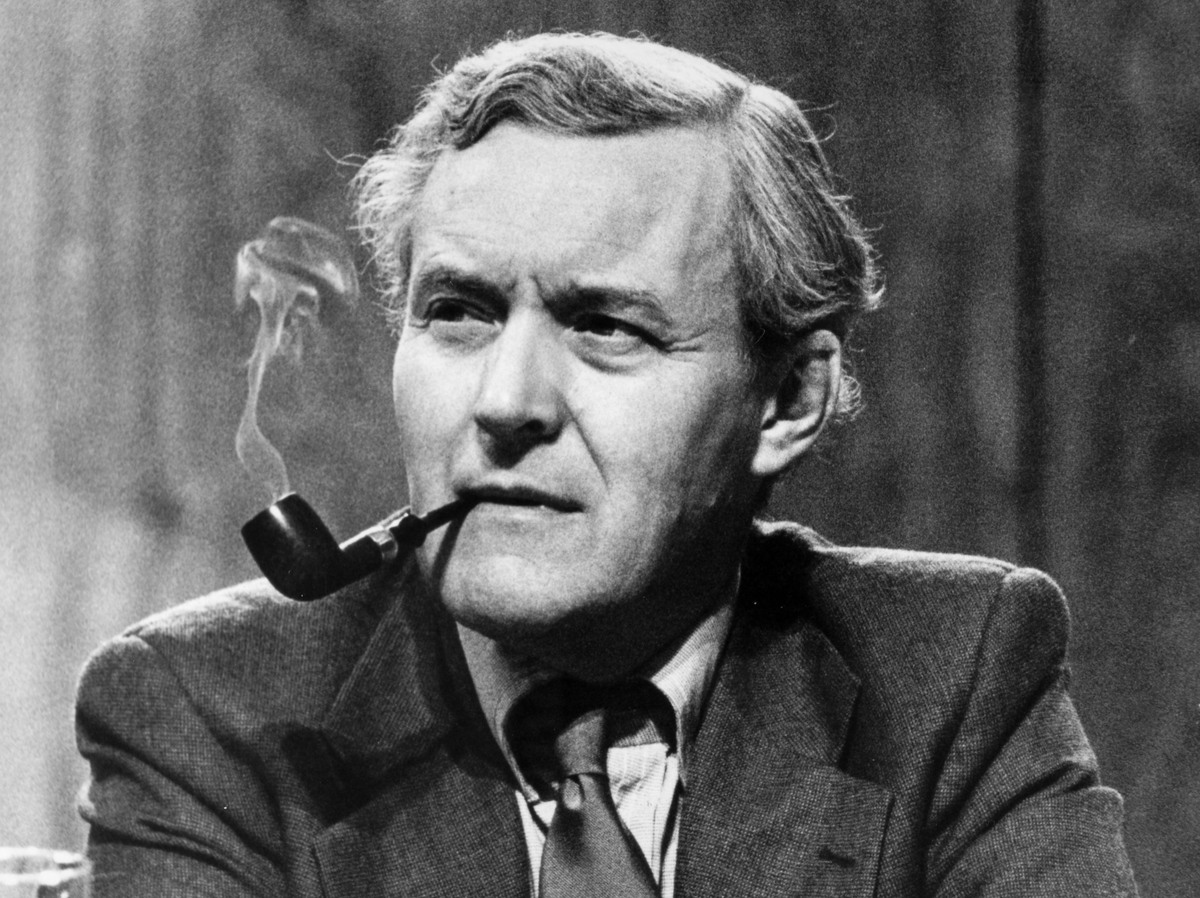
Tony Benn
The superficial attraction of this kind of thinking is immediate. The Corbyns of today, the Benns of yesterday and the Coles of the day before, all pointed to the towering concentrations of capitalist power and wealth that overshadow the festering estates of the poor. ‘Make it all democratic’ they say, ‘let the public own, and decide upon, what is to be done with the banks, railways, enterprises, and all the rest. This is just democracy in action.’
But there are grounds to hesitate. Leaving aside the issue of public ownership, democracy is not a solution to every problem. Furthermore, there are logical, practical and even ethical arguments against an indefinite extension of democracy. There are very good reasons to be in favour of democratic government. But the limits to democracy should also be acknowledged.
Absolutism refers to a form of undemocratic and unaccountable government. Absolutism also refers to the idea that a principle or standard should be all-encompassing or supreme. In the latter sense, some people are democratic absolutists. I offer an explanation why they are wrong. If you feel uncomfortable with this ironic conjunction of meanings, then you may substitute with something like ‘ultra-democracy’ instead.
First I outline some well-known logical problems with ultra-democracy (you may skip this section if you are more interested in practicalities). I then point to some practical problems with ultra-democracy. I end up defending representative democracy.
Logical problems with democracy
It is very easy to show that the absolute democratisation of every important decision is impossible. A decision cannot be made democratically without prior rules on how the vote is to be conducted. How is the proposal tabled? Who can vote? What system of voting is used? Can the proposal be amended? And so on.
That is why states or organisations have constitutions or standing orders, which hopefully can deal with these issues. Some of these ground rules – such as the constitution itself – may have previously been put to the vote. But then too some rules were assumed, concerning the way that vote was conducted. Often the choice of those rules were crucial for the outcome. But it is logically impossible to have a vote on every prior rule that is necessary for a vote to take place. It’s an example of an infinite regress.

Nicolas de Condorcet
Another intractable logical problem is the paradox of voting, as first explained by the French revolutionary Nicolas de Condorcet (1743-1794). Condorcet showed that while individuals themselves may have consistent preferences over different outcomes, when brought together in a population the collective expressions of those preferences may be inconsistent. Jonathan Portes has illustrated this neatly in the Brexit case. Attempts to deal with this problem – such as two-stage voting, as in French Presidential elections – are both fallible and dependent on prior choices of rules.
There is also the Arrow impossibility theorem, named after the Nobel economist Kenneth Arrow. His theorem states that no rank-order voting system can be designed that always satisfies these three reasonable criteria of fairness. I do not need to go into further details here. The overall point is that all attempts to implement democracy are inevitably incomplete, involve prior assumptions that cannot be voted upon, and may violate some principles of consistency or fairness.
Practical problems with ultra-democracy
Major practical problems with ultra-democracy stem from the complexity and scale of modern society. A small club or group can run things relatively easily. But even then, special skills are required, such as being able to keep accounts or chair meetings.
Making decisions and managing human interactions in a large-scale society is immensely more complex. Personal familiarity and trust remain vital at the family and small community level, but with decisions involving thousands and millions of people, something else is required. There has to be some kind of government, of one kind or another, based on some form of authority.
Consider the ‘democratic control’ of industry, favoured by Cole, Benn and Corbyn. Worker cooperatives are a workable and meritorious alternative to capitalist corporations. But even here, only a tiny proportion of decisions can be delegated to ballots or mass meetings. The complex processes and technologies of production have to be broken up into manageable units. The advice of experts has to be relied upon.
In addition, a lot of decision-making has to be devolved. We are no longer a world where the role of an office secretary is simply to take down shorthand and type it out. A great deal of work involves processing information and making judgements, even at lower management levels. Think how many small judgements are made at work each day. It would be impossible to be ‘democratic’ and put them to the vote.
Greater industrial democracy, with worker participation in some workplace decisions, can improve productivity and make work more enjoyable. Moves in this direction are important and valuable. But it is impractical to have votes on more than a tiny fraction of the important decisions that have to take place every day in any large, complex economy.
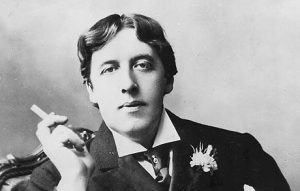
Oscar Wilde
Everyone’s participation in every major decision, even if limited to a town or region, would be a crushing burden of endless decision-making on every citizen. It would guarantee economic paralysis. Oscar Wilde was right: socialism is impossible because it would take too many meetings.
Supporters of an ultra-democratic society, where individuals make decisions throughout industry as well as the polity, fail to consider the problems of relevant knowledge and the sheer number of meetings and decisions involved. That is why, contrary to the claims of many socialist ultra-democrats, private ownership and control are necessary to a large degree, so that producers and consumers can make decisions (within legal limits) through contracts and markets, unencumbered by local or national committees and their inevitable bureaucracies.
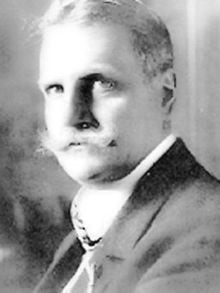
Robert Michels
Robert Michels (1876-1936) was a student of Max Weber. He argued persuasively that full democratic control was impossible in large-scale, complex organizations. For individuals to coordinate and act together, sizeable organizations need leaders, who then delegate administrative tasks to complex bureaucracies. Leaders and bureaucrats manage information flows between members of the organization. They develop skills, and acquire expertise and knowledge, that are peculiar to their roles. Knowledge is specialized, and the management of information has unavoidably to be selective. It is impossible for everyone to become a specialist in more than a few areas, or to take account of every piece of information in the organization. Inevitably, this leads to oligarchy, with some power shifting away from individuals at the base.
Michels underlined the oligarchic distribution of knowledge and power in large, complex organizations. Because of localized knowledge, specialisms, complexities, and massive amounts of information, a direct democracy, where everyone votes on everything, is not viable. It is impossible to involve everyone in every significant decision. Michels argued in detail that ‘the principle cause of oligarchy in the democratic parties is to be found in the technical indispensability of leadership.’
The moral limits to democracy
Many Left politicians emphasize the importance of human rights. This is no less true of Tony Benn or Jeremy Corbyn. The specification and justification of those rights are controversial. But the majestic modern statement is the United Nations Universal Declaration of Human Rights of 1948. It proclaims inalienable rights including freedom of expression, freedom of worship, freedom from torture, and so on. It also includes the right to own private property, which may be an anathema for some socialists, but can be justified on the grounds of the right to resources for self-development and autonomy.

John Adams
We may disagree on what should or should not be included on the list of universal human rights, but as long as we accept the veracity of any such list, then there is a problem for ultra-democracy. Two principles collide: the ultra-democratic maxim that if possible issues should be decided by a vote, and the idea that human rights are inalienable and may not be countered by any political power, democratic or otherwise. On this basis, some democratic votes can be immoral, such as a resolution to suspend important rights in the event of a national emergency.
As the American politician John Adams (1735-1826) pointed out, the rule of the majority can be abused to counter the rights or legitimate interests of minorities. That is one reason why universal human rights are important: their assertion protects minorities suffering illegitimate discrimination in the hands of majorities. Ultra-democracy opens the door for unwarranted discrimination and the disregard for rights. For democracy to work well, all powerful parties and interest groups must recognise its limits.
In principle, if sometimes not in practice, rights are protected by courts, including supreme courts whose role is to safeguard individual rights and the constitution. Courts are there to prevent democratic decisions countering human rights or breaking existing laws. It is even possible that the Brexit referendum was illegal, and the decision of the majority could be legally overturned.
Why democracy is essential
The most important reason for democracy is the legitimation of political power. Prior to the modern era, the authority of a tribal chief or a national monarch was legitimated by religion, myth, tradition, family descent, combat, or some combination of these. The rationalism of the Enlightenment changed all that. The English Levellers, the American Revolutionaries and the French Jacobins all sought to replace hereditary monarchies, which had been legitimised by religion. Instead there would be parliamentary system, with delegates elected from the population of adult males. The claim for legitimacy would be popular mandate, based on the male heads of households.
|
My forthcoming book elaborates on some of the political issues raised in this blog:
Wrong Turnings: How the Left Got Lost
To be published by University of Chicago Press in November 2017
|
Of course, the major deficit here was the denial of votes to women, which was not widely recognised as an important omission until the second half of the nineteenth century. (Incidentally, the Marquis de Condorcet – mentioned above – was a very early advocate of female suffrage.) Neither the Levellers nor the Jacobins thought ‘servants’ (i.e. employees) should have the right to vote. Different American states had different rules, but property qualifications for voting were widespread. In practice, Native Americans and many African Americans could not vote until 1924 and 1965 respectively.
These extensions in the franchise reflected human rights. These were the ideological and moral forces behind the extension of the franchise. Often, the existing institutions of limited democracy were insufficient to establish these rights. Change came through crisis, protest, violence or war, with movements under the banners of universal rights.
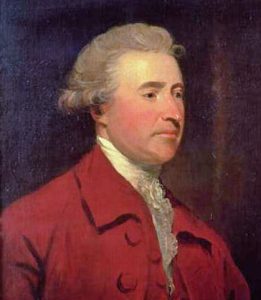
Edmund Burke
The Enlightenment gave us the principle of universal rights, and the notion of political sovereignty based on a democratic mandate from the masses. But many contemporary thinkers were aware of the problems involved. Charles-Louis Montesquieu (1689-1755) stressed the importance of checks and balances in the political system. Edmund Burke (1729-1797) argued that a polity should recognise the wisdom of tradition, as well as the carefully-applied and well-informed guidance of reason.
Burke was astutely aware of the complexities and uncertainties involved in governance. He stressed that members of parliament were there to uphold the interests of the nation as a whole. Decisions had to be reached through detailed discussion and expert advice. Members of parliament were not delegates, to be mandated through the expressed opinions of their constituents.

Thomas Paine
The great radical thinker Thomas Paine (1737-1809) also understood that in larger societies, direct and complete participatory democracy is impossible. Problems of complexity, scale and location place severe limits on democratic involvement. Given the impracticalities of large-scale direct democracy, nations should adopt systems of representative democracy, relying on professional and trained experts in government offices. Paine would have also rejected the ultra-democratic dreamings of some socialists, including Benn and Corbyn.
By contrast, Tony Benn argued that Labour Party Members of Parliament should be mandated by their constituency parties. Corbyn has gone even further in this direction, proposing that party members should dictate policy to their MPs. This undermines a central principle of parliamentary democracy. An important reason for a parliament is that it provides a forum where proposals may be debated, expert advice may be heard and details amended.
The idea that MPs should simply represent the will of their constituents, or be instructed by their local constituency parties, would make parliament redundant. Instead we could all watch television, and as in a game show, express our preferences on every issue, from capital punishment to the expulsion of immigrants. This easily could steam-roller over human rights, and through manipulation serve a dictatorship.
Within a system of representative or parliamentary democracy it is possible to make a case for or against referendums on important issues. In Switzerland referendums are common. Their origins there are in the nineteenth century, where there was a need to keep together a country highly fractured on linguistic, religious and political lines.
Opponents of referendums argue that they can weaken representative democracy. They can be used by the party in power to resolve its internal disputes, or to abdicate responsibility over a difficult decision. The idea that a referendum should be more than advisory rests on a notion of direct rather than representative democracy, and assumes that a large number of voters have the capacity to make an informed decision, untainted by (say) a biased mass media or demagogic leaders. Hence some democratic countries – notably Germany – have legal provisions to limit the use of referendums at the national level.
Conclusion
The current political crisis in the UK has made the nature and role of democracy key issues for discussion and clarification. My first argument here that a leftist strain of ultra-democratic thinking – from Lenin to Corbyn – is untenable. I also argue that democracy and human rights can come into conflict, and when they do the former should submit to the latter.
Ultra-democracy cannot work. Through the frustration of endless committees and meetings, and the collapse of productive activity, attempts to move in this direction would lead to crisis. Unworkable plans for ultra-democracy would both raise and disappoint expectations, leading to the impatience of all, and a likely authoritarian reaction. The road to hell is paved with good intentions.
There are strong practical and moral reasons to support representative democracy, particularly as a means of legitimising government power. The key proviso is that a government should be in principle removable by the electorate – not that the electorate should be the government.
There is strong evidence that representative-democratic systems, where there is some protection of human rights, can reduce the risks of famine and war. Evidence also suggests that democracy may also help economic development, at least for those countries above relatively low levels of output per capita.
I leave it to the reader to deliberate on the pros and cons of holding referendums. The Brexit experience has been illuminating, at least in that regard.
When the Brexit outcome was announced on 24 June, Corbyn immediately declared that the government should take Britain out of the European Union. He was being consistent with his dangerous view that politicians should carry out the orders of the electorate, irrespective of the slim Brexit majority and the lies and false promises in the debate.
30 June 2016
Bibliography
Arrow, Kenneth J. (1951) Social Choice and Individual Values (New York: Wiley).
Benn, Tony (1979) Arguments for Socialism (London: Jonathan Cape).
Benn, Tony (1981) Arguments for Democracy (Harmondsworth: Penguin).
Burke, Edmund (1774) ‘Speech to the Electors of Bristol’. Available on: http://press-pubs.uchicago.edu/founders/documents/v1ch13s7.html
Claeys, Gregory (1989) Thomas Paine: Social and Political Thought (London and New York: Routledge).
Cole, George D. H. (1920) Guild Socialism Re-Stated (London: Parsons).
Michels, Robert (1915) Political Parties: A Sociological Study of Oligarchical Tendencies of Modern Democracy (New York: Hearst).
Polan, Anthony J. (1984) Lenin and the End of Politics (London: Methuen).
Portes, Jonathan (2016) ‘The Condorcet Paradox at Work? Rock-Paper-Scissors in the EU Referendum’, 6 June. http://www.niesr.ac.uk/blog/condorcet-paradox-work-rock-paper-scissors-eu-referendum#.V3IpwU1TF9A
Waldron, Jeremy (1988) The Right to Private Property (Oxford and New York: Oxford University Press).
Wilde, Oscar (2000) Oscar Wilde: A Life in Quotes, ed. Barry Day (London: Metro).
Posted in Brexit, Democracy, Jeremy Corbyn, Uncategorized
June 5th, 2016 by geoffhodgson1946
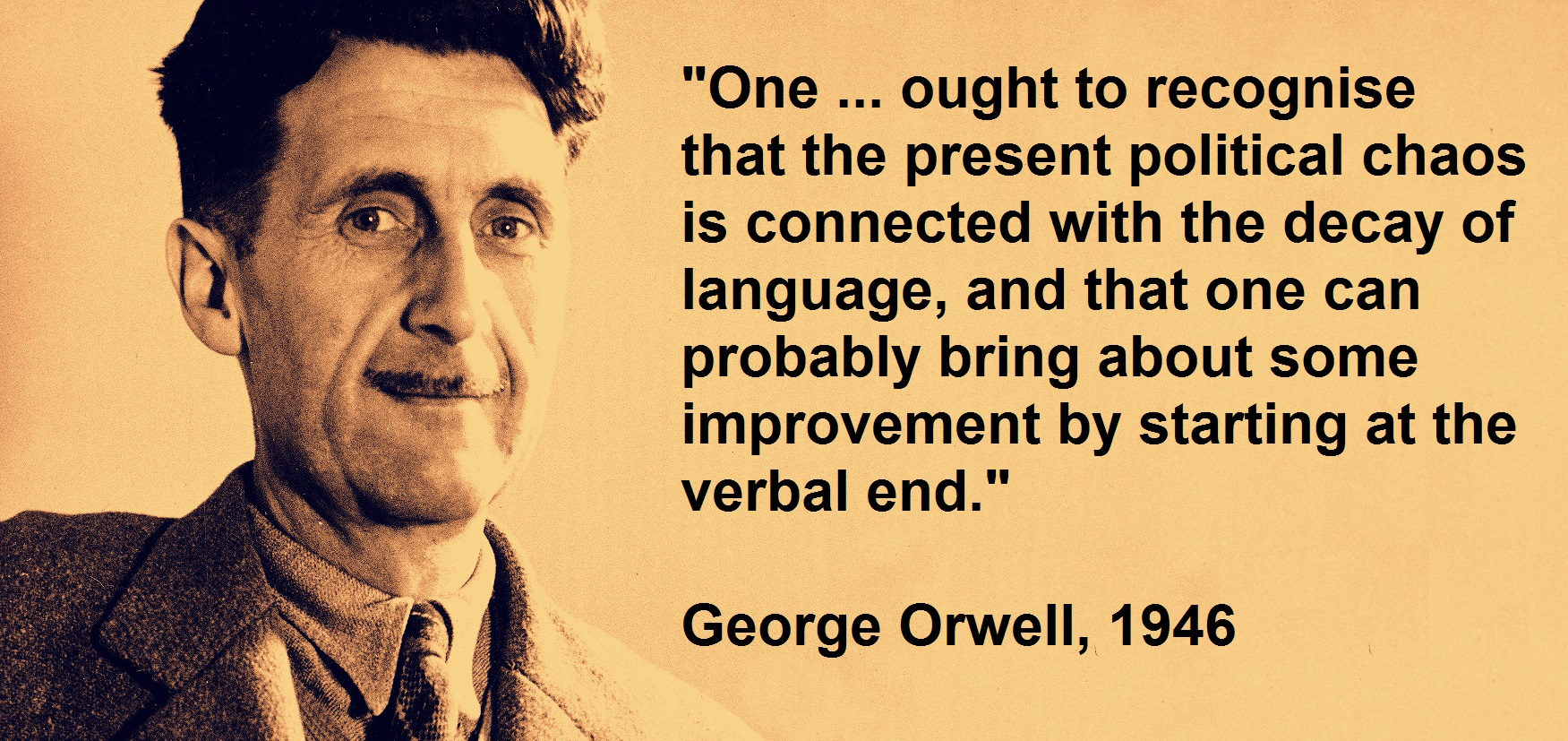
Geoffrey M. Hodgson
The terms Left and Right have become ambiguous and self-contradictory. Today the term ‘right-wing’ is applied to diverse and opposed views such as the following:
♦ Those who favour private ownership and markets are often placed on the political Right, including those who are strong supporters of democracy and human rights.
♦ Those who put private property above everything, and care less about democracy, are also described as Right.
♦ Pro-market libertarians, who are so strongly against states that they oppose wars, are also described as Right.
♦ Nationalists that venerate the national state are also described as Right, even if they support democracy and individual rights.
♦ Fascists and racists are also seen as Right, including those who would pursue wars and would limit individual freedoms or rights
Hence the debased term Right now covers democrats and despots, peace-mongers and war-mongers, nationalists and individualists, and defenders and opponents of human rights. There is nothing about private ownership and markets that necessarily implies racism or belligerent nationalism. Yet these different things are conflated under the same label.
The word Left has also slipped into various contradictory usages:
♦ Advocates of substantial state intervention in the economy, typically with some planning and nationalized enterprises, are described as Left.
♦ Advocates of a minimal state, with autonomous communes instead of nationalized industry, are also described as Left.
♦ People who care less about democracy or liberty, and much more about public ownership, national planning or the abolition of poverty, are often described as Left.
♦ Champions of extended democracy, decentralization, popular sovereignty, individual liberty and freedom of expression are often described as Left.
Accordingly, the term Left is now applied to both statist centralizers and communitarian decentralizers, to both totalitarians and ultra-democrats, and to both minimizers and maximizers of liberty.
 Both the Left and the Right have advocated forms of collectivism. The word fascism derives from its symbolic use of the fasces of Ancient Rome, with rods bound together to signify collective strength. Fascism subjected individualism to the collective whole. Similarly, nationalism extols the nation over the individual. If you insist that collectivism is Left, be warned that fascism and nationalism also incline in the same collectivist direction.
Both the Left and the Right have advocated forms of collectivism. The word fascism derives from its symbolic use of the fasces of Ancient Rome, with rods bound together to signify collective strength. Fascism subjected individualism to the collective whole. Similarly, nationalism extols the nation over the individual. If you insist that collectivism is Left, be warned that fascism and nationalism also incline in the same collectivist direction.
Also, as shown below, both the Left and the Right have been aligned with forms of individualism and private property. These terms have become confused and unclear.
The original Left
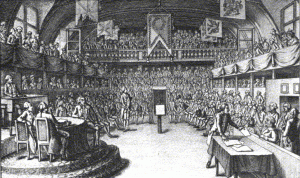 The origins of the political terms Left and Right are in the French Revolution. In 1789, in the National Constituent Assembly, those deputies most critical of the monarchy began to congregate on the seats to the left of the President’s chair. Conservative supporters of the aristocracy and the monarchy would congregate on the right side of the Assembly. The Baron de Gauville explained:
The origins of the political terms Left and Right are in the French Revolution. In 1789, in the National Constituent Assembly, those deputies most critical of the monarchy began to congregate on the seats to the left of the President’s chair. Conservative supporters of the aristocracy and the monarchy would congregate on the right side of the Assembly. The Baron de Gauville explained:
‘We began to recognize each other: those who were loyal to religion and the king took up positions to the right of the chair so as to avoid the shouts, oaths, and indecencies that enjoyed free rein in the opposing camp.’
Those seated to the left of the Constituent Assembly wished to limit the powers of the monarchy, and eventually to create a democratic republic.
Those on the right wished to maintain the authority of the Crown by means of a royal veto, to preserve some rights of the aristocracy, to have an unelected upper house, and to maintain major property and tax qualifications for voting.
By contrast, the Left demanded an end to aristocratic privileges, limitations to the power and privileges of the church, a single-chamber legislature in which all power rested with democratically elected representatives, and a broad popular – but wholly male – franchise.
 In 1789, Jacobin Clubs sprung up all over France. Originally the Jacobin Clubs were an inclusive forum for all revolutionaries; people later described as Girondins and Montagnards were among their number.
In 1789, Jacobin Clubs sprung up all over France. Originally the Jacobin Clubs were an inclusive forum for all revolutionaries; people later described as Girondins and Montagnards were among their number.
The Girondins acquired that name because a number of them came from the départment of the Gironde. The Montagnards were a radical faction within the Jacobins: they took their name from their occupation of the higher seats behind the President of the Assembly.
By 1791 the Jacobin Clubs were dominated by Girondin intellectuals and orators. Hence Girondins such as Jacques-Pierre Brissot and Thomas Paine were also Jacobins.
At least from 1789 to 1792, when the label was most inclusive, the Jacobins as a whole were the Left. Like other radical Enlightenment thinkers, they believed that ideal governments were founded on natural rights and by the will of the people, rather than on religion or tradition.
Accordingly, the Left and Right divided on the question of the legitimate source of authority for government, and on the question of universal and equal human rights. To be Left was to reject aristocracy or religion as sources of authority, and instead claim authority in the will of the people.
The Girondins and the Jacobins supported the use of force to defend the gains of the Revolution and took an aggressive stance against hostile foreign powers. More militant Jacobins argued for suspensions of democratic powers to facilitate a more rapid purging of feudal or aristocratic powers. Some supported the execution of the King, despite a prominent earlier Jacobin sentiment in favour of the total abolition of the death penalty.
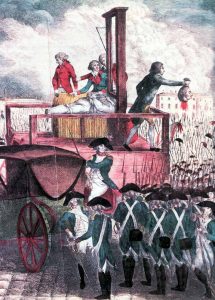 The Girondins had a majority in the National Convention; they controlled the executive council and filled the ministries. But the Montagnards controlled vital Parisian institutions including its National Guard.
The Girondins had a majority in the National Convention; they controlled the executive council and filled the ministries. But the Montagnards controlled vital Parisian institutions including its National Guard.
On 2 June 1793 the Parisian National Guard was deployed to purge the National Convention of the Girondins. Most leading Girondins were imprisoned and executed, and thus began the Reign of Terror, with many thousands of killings by the guillotines, militias or mobs.
After the coup against the Girondins, the term Jacobin acquired a narrower meaning, connoting vigorous, uncompromising, and violent revolutionary action, in line with the Montagnards.
What the Left was not
If energy and determination are Left, then the Montagnards were to the Left of the Girondins. But degrees of fanaticism, activism and violence are poor criteria to differentiate political doctrines. We should be concerned more with the nature of an ideology than the manner it is pursued or expressed.
 A prominent attempt to delineate Left from Right was proposed by David Caute in his popular volume The Left in Europe since 1789. Caute argued that the defining and enduring feature of the Left is its advocacy of popular sovereignty, against the supremacy of the monarchy and the church, as upheld by the Right.
A prominent attempt to delineate Left from Right was proposed by David Caute in his popular volume The Left in Europe since 1789. Caute argued that the defining and enduring feature of the Left is its advocacy of popular sovereignty, against the supremacy of the monarchy and the church, as upheld by the Right.
Caute depicted Maximilien Robespierre as the main campaigner for universal suffrage. For Caute, ‘the Left in 1793 constituted those to the left of the Girondins.’ He wrote of the ‘moderate liberal’ Girondins and the ‘radical democratic’ Jacobins. But Caute’s claims are easily refuted.
Consider two influential Girondins. Jacques-Pierre Brissot played such a central role among the Girondins that for a while their whole group were called Brissotins. Before 1789, in advance of Robespierre, Brissot advocated a democratic republic in France. He argued against electoral qualifications based on income or property and instead proposed a representative government based on universal male suffrage. This then became Jacobin orthodoxy. Brissot also took the abolitionist lead in campaigning against slavery.

Nicolas de Condorcet
Nicolas de Condorcet was another leading abolitionist and also aligned with the Girondins. Condorcet was one of the first few advocates of female suffrage. He was not followed by Robespierre in that respect.
Contrary to Caute’s depiction, the prominent examples of Brissot and Condorcet show that leading Girondins were earlier and more inclusive in their proposals for a democratic franchise than Robespierre. The Girondins as a whole were no less radical in their democratic aims than Robespierre and other Jacobins.
Generally, the Girondins argued against the suspension of democratic powers. By contrast, Robespierre and other Montagnards were more willing to suspend democracy in times of alleged emergency.
Otherwise, in terms of ends (but not means) there was little to distinguish between Brissot, Condorcet and other Girondins, on the one hand, and Robespierre and other Montagnards, on the other.
The original Left and private enterprise
In pre-revolutionary France under King Louis XIV there were numerous corporations, closely tied up with royal power and bureaucracy. The sale of corporate offices provided an important source of royal revenues. In return, numerous corporations and guilds received privileges from the king.
In search of an individualistic utopia, and against the despised institutions of the Ancien Régime, from June 1791 the French revolutionary authorities enacted laws that prohibited organizations of workers, professionals and entrepreneurs, and ended much state regulation of business. Business coalitions, guilds and even business corporations were abolished. Individuals were free to pursue their business interests but forbidden to join together for business purposes.
But this revolutionary experiment in free-market, ultra-individualism was short-lived. There were no civil mechanisms to set standards or codes of conduct. Consequently and necessarily, corporations were later reinstated.
Crucially, from the Girondins to the Montagnards, the Left leaders of the French Revolution advocated an individualistic, property-owning, market economy, just as the English Levellers had done in the 1640s and the American revolutionaries in the 1770s. Under the monarchy, the French revolutionaries had experienced the ill effects of state monopolies and other large agglomerations of economic power. They wanted none of them. They defended private property and private enterprise. As the Fabian socialist R. H. Tawney put it: ‘the dogma of the sanctity of private property was maintained as tenaciously by French Jacobins as by English Tories’.

Gracchus Babeuf
Some see Gracchus Babeuf as the ultimate Leftist of the French Revolution. Babeuf supported the Reign of Terror and was imprisoned in 1794 for his criticism of the group that ended the Terror and executed Robespierre.
After his release from prison in 1795, Babeuf advocated common ownership and the abolition of private property, to be achieved if necessary by the methods of terror. He was the first revolutionary communist of modern times. He aimed at the equal distribution of income and wealth. Babeuf and his followers planned to seize national power, and then rule on behalf of the masses, until the people were educated and deemed able to rule through locally-elected bodies. Babeuf’s conspiracy was uncovered in 1796 and he was then executed.
Babeuf had a point. How could equality of rights, equality under the law, and the abolition of inherited privileges, be squared with the concentrated inheritance of wealth, much of it being a hangover of the feudal era? How could the abolition of feudalism be reconciled with the persistence of such juxtapositions of luxury with squalor?
But by focusing on this problem alone, Babeuf and his followers pushed the revolutionary slogan of equality far beyond the matter of equivalent treatment under the law. They negated several other important rights that the revolution had enshrined, including the rights to individual property and of freedom of expression and assembly.
Although linked with the thinking of the time, the short-lived conspiracy of Babeuf was hardly representative of the Revolution as a whole. While his slogan was absolute equality, the abolition of private property went against prevalent Jacobin opinion. He was a product of the Revolution, but he was not typical of it.
Using Babeuf to establish a Left lineage, is no less absurd than suggesting that mass executions, terror, dictatorship and Bonapartism are all Left. It is more sensible to apply the term Left to the doctrines that prevailed in 1789-1792, rather than to the bloody upheavals and transgressions that followed.
Changing the meanings of Left and Right

Robert Owen
When socialism emerged in the 1830s, with the ideas of Robert Owen and others, it underlined equality and solidarity, but sometimes to the detriment of liberty, autonomy or even democracy. Owen opposed parliamentary democracy, lawyers and legal institutions, and the 1832 Reform Bill. Prominent early socialists wanted rational, harmonious communities, and saw division and debate – in courts or parliaments – as counter-productive. This was the first wrong turning for the post-1789 Left.
In the 1840s, Karl Marx and Frederick Engels joined their version of socialism to the predicted victory of the proletariat in the class struggle, and its expropriation of the capitalist ruling class. In his Socialism: Utopian and Scientific, Engels described the principles and rights of the French Revolution as ‘nothing more than the idealized kingdom of the bourgeoisie’. These principles and rights were sacrificed at the altar of class struggle. This was another wrong turning.
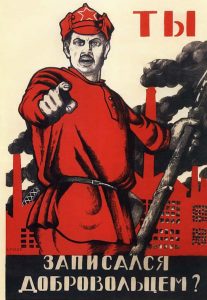 The first Marxist government was established in Russia in 1917, and it quickly evolved into a one-party state. Purges and terror ensued. But many on the left supported the Soviet Regime. The Left label became associated with totalitarianism, with minimal human rights, sham trials, mass executions, limited freedom, and arbitrary confiscations of property. The original meaning of Left was turned upside down.
The first Marxist government was established in Russia in 1917, and it quickly evolved into a one-party state. Purges and terror ensued. But many on the left supported the Soviet Regime. The Left label became associated with totalitarianism, with minimal human rights, sham trials, mass executions, limited freedom, and arbitrary confiscations of property. The original meaning of Left was turned upside down.
As noted above, state-sponsored monopolies were strongly opposed by the French revolutionary Left in 1789. Hence the original Left would have been opposed to the nationalisation of enterprises. For these and other reasons, by the original meaning of the term, there is a case for regarding Stalinism and Maoism as Right.
The term Right has long been linked with authoritarianism, discrimination, the repression of popular sovereignty and the denial of equality under the law. In this vein, it was coupled with the rising fascism of the 1920s and 1930s, in Italy, Germany, Spain and elsewhere. Both Left and Right acquired repressive and authoritarian connotations.

Benito Mussolini & Adolf Hitler
While Marxists since 1848 had wrenched the term Left from its Enlightenment roots, the militant nationalisms and fascisms of the first half of the twentieth century delayed any major shift in the meaning of the word Right. As late as the 1960s it still had strong associations with traditionalism, nationalism, theocracy and fascism. Conservatives in Europe and America supported dictatorships in Latin America, or were apologists for South African Apartheid: these conservatives were appropriately described as Right.
But eventually the term Right also shifted massively, from nationalist and traditionalist apologies for the privileges of aristocracy, to greater advocacy of free markets and private ownership, which ironically had been the territory of the original Left in the French Revolution.
With the collapse of the Keynesian-welfare consensus in the 1970s, a confident free-market neoliberalism took ground. By 1980, some thinkers on the Right had captured a swathe of liberal territory that had been long vacated by the original Left. Both free-marketeers, as well as condoners of dictatorships, were seen as Right.

Ronald Reagan & Margaret Thatcher
But many on the Right – including US President Ronald Reagan and UK Prime Minister Margaret Thatcher – were inconsistent in their promotion of individualism and liberty. They championed large corporations. They also supported dictatorships and opposed sanctions against South African Apartheid.
Rightly or wrongly, their claimed free-market views were compromised by their negative attitudes to drugs and prostitution and their devotion to conservative and non-individualistic ‘family values’. But many libertarian advocates of free-markets support democracy and oppose dictatorships.
|
This book by G. M. Hodgson elaborates on some of the political issues raised in this blog:
Wrong Turnings: How the Left Got Lost
Published by the University of Chicago Press in January 2018
|
The abandonment of major ‘socialist’ experiments in China and the Soviet Bloc in the 1980s led to a further seismic shift. Within the Eastern Bloc countries, the rising radicals promoted free enterprise and democracy: they were against the status quo. By contrast, promoters of nationalization and comprehensive planning on the contemporary Left were seen as reactionary defenders of a doomed social order. This bewildered some 1960s radicals from the West, who discovered in the 1990s that the Eastern European revolutionaries were libertarian advocates of free enterprise and private property.
At least since 1990, the term Right has meant support for market solutions, alongside its enduring alternative associations with nationalism and authoritarianism. For over a century, the Left has been associated with state intervention and ownership. Ironically, in key respects, these terms have now swapped places. In 1789 the original Right advocated state monopolies and some state intervention, while the original Left advocated free markets.
 Many 1960s radicals were critical of Soviet-style totalitarianism. Many also opposed the military confrontations of the Cold War. There was a huge movement of opposition to the war in Vietnam. There were also demonstrations against the 1968 Soviet invasion of Czechoslovakia. The 1960s sensitized many on the Left against militaristic attempts by major powers to impose their will on others.
Many 1960s radicals were critical of Soviet-style totalitarianism. Many also opposed the military confrontations of the Cold War. There was a huge movement of opposition to the war in Vietnam. There were also demonstrations against the 1968 Soviet invasion of Czechoslovakia. The 1960s sensitized many on the Left against militaristic attempts by major powers to impose their will on others.
By the 1970s, some on the Left went further, to oppose any exportation of Western ideas, and to reject any notion that poorer countries deserved to enjoy the same human rights that were promoted and (partly) realised in Western Europe and North America. Even peaceful proposals to extend these rights or values were seen as apologies for ‘Western imperialism’ or for the ‘US Empire’. Ambitions to export Western-style democratic institutions or rights were seen as ideological covers for capitalist imperialism.
Hence, for many on the Left, their anti-militarism turned into opposition to any attempt to spread Western values, peaceful or otherwise. Universal principles and rights held up by the French revolutionary Left of 1789, were seen by some of the 1970s Left as mere excuses for Western militarism or oppression.*
Following Marx and Engels much earlier, many leftists came to see such Enlightenment principles and rights as a sham. They abandoned central defining ideas of the original Left. This was yet another wrong turning.
The language of politics is now broken. Any project to revive the Left must look at its own origins and the wrong turnings it has taken in its journey since 1789. Of course, the world has changed, and some words can reasonably reform their meanings. But the original Left stood for equality under the law, representative democracy and universal human rights. These principles are as important now as they were in 1789.
5 June 2016
Minor edits: 13, 27 December 2016, 1 May 2017
* For the record, I opposed Western aggression in Vietnam. I was also against the 2003 invasion of Iraq. The fact that US President George W. Bush and UK Prime Minister Tony Blair attempted to justify the 2003 invasion in terms of the exportation of human rights and democracy does not mean that the invasion was justified. Promoting commendable institutions or values does not imply that they can or should be imposed by military force.
Bibliography
Caute, David (1966) The Left in Europe Since 1789 (London: Weidenfeld and Nicolson).
Cohen, Nick (2007) What’s Left? How the Left Lost its Way (London and New York: Harper).
Doyle, William (2002) The Oxford History of the French Revolution (Oxford and New York: Oxford University Press).
Hodgson, Geoffrey M. (2017) Wrong Turnings: How the Left Got Lost (Chicago: University of Chicago Press) forthcoming.
Lavoie, Donald (1985) National Economic Planning: What is Left? (Cambridge, MA: Ballinger).
Stewart, John Hall (1951) A Documentary Survey of the French Revolution (New York: Macmillan).
Tawney, R. H. (1921) The Acquisitive Society (London: Bell).
Posted in Common ownership, Democracy, Left politics, Right politics, Socialism, Uncategorized











 Putting the blame on “neoliberalism” underestimates the way in which outsiders such as Trump and Farage have created populist movements that blame “the elite” and offer simplistic solutions, such as to “curb immigration”. Blaming “neoliberalism” underestimates the pernicious influences of racism and anti-Muslim prejudice.
Putting the blame on “neoliberalism” underestimates the way in which outsiders such as Trump and Farage have created populist movements that blame “the elite” and offer simplistic solutions, such as to “curb immigration”. Blaming “neoliberalism” underestimates the pernicious influences of racism and anti-Muslim prejudice. 


 Unlike any false claim that “neoliberalism” has reduced overall taxes, the increase of privatisation is manifest. In addition, it has sometimes led to deleterious consequences including lower pay for workers and a reduced quality of services.
Unlike any false claim that “neoliberalism” has reduced overall taxes, the increase of privatisation is manifest. In addition, it has sometimes led to deleterious consequences including lower pay for workers and a reduced quality of services.
 Ken Loach’s moving film, I, Daniel Blake, portrays the heart-breaking human consequences of the UK Conservative government’s shredding of the welfare safety net for the poor. Attempts to reduce public spending in many countries have led to millions of human tragedies like this.
Ken Loach’s moving film, I, Daniel Blake, portrays the heart-breaking human consequences of the UK Conservative government’s shredding of the welfare safety net for the poor. Attempts to reduce public spending in many countries have led to millions of human tragedies like this. All this is real, and tragic. Millions have suffered because of such misguided policies. But we should not jump to the conclusion that “neoliberalism” has been successful in moving toward a minimal economic role for the state.
All this is real, and tragic. Millions have suffered because of such misguided policies. But we should not jump to the conclusion that “neoliberalism” has been successful in moving toward a minimal economic role for the state.

 The first sentence is valid and important. The second is simplistic. As I elaborate in my book
The first sentence is valid and important. The second is simplistic. As I elaborate in my book  Impersonal relations occur in bureaucracies as well as in markets. Large-scale systems of national planning also make much interaction impersonal. People become atomised; they become numbers, to be processed by bureaucrats and computers.
Impersonal relations occur in bureaucracies as well as in markets. Large-scale systems of national planning also make much interaction impersonal. People become atomised; they become numbers, to be processed by bureaucrats and computers. But such nuances have been lost in a global storm of “neoliberal” accusations. Klein and Monbiot have added some force and authority to this widening tempest.
But such nuances have been lost in a global storm of “neoliberal” accusations. Klein and Monbiot have added some force and authority to this widening tempest.
 Polanyi has been repeatedly cited by popular academics and journalists including
Polanyi has been repeatedly cited by popular academics and journalists including  The Great Transformation contains a chapter on the Speenhamland Law of 1795, which implemented a form of outdoor relief intended to mitigate rural poverty in England.
The Great Transformation contains a chapter on the Speenhamland Law of 1795, which implemented a form of outdoor relief intended to mitigate rural poverty in England. US Republican President Richard Nixon was once in favour the idea of a universal basic income, and drew up a plan to implement it. But then he abandoned the idea.
US Republican President Richard Nixon was once in favour the idea of a universal basic income, and drew up a plan to implement it. But then he abandoned the idea.  While some public ownership and planning may be desirable, I argue in my
While some public ownership and planning may be desirable, I argue in my 

 Jeremy Corbyn is very different from Nigel Farage and Donald Trump. Corbyn is neither a racist nor a misogynist (
Jeremy Corbyn is very different from Nigel Farage and Donald Trump. Corbyn is neither a racist nor a misogynist (




 Consider the example of the EU referendum in June 2016. After the result, Corbyn took it for granted that Britain should leave the EU and immediately trigger Brexit, irrespective of the outcome of Britain’s negotiations on the terms of leaving. Like his fellow-populist Farage, Corbyn accepted that ‘the people had spoken’. For him, the expression of popular will was the end of the matter.
Consider the example of the EU referendum in June 2016. After the result, Corbyn took it for granted that Britain should leave the EU and immediately trigger Brexit, irrespective of the outcome of Britain’s negotiations on the terms of leaving. Like his fellow-populist Farage, Corbyn accepted that ‘the people had spoken’. For him, the expression of popular will was the end of the matter.

 Trotskyists are socialists who believe in the common ownership of the means of production. This goal was stated in Labour’s Clause Four from 1918 to 1995, so why shouldn’t Trotskyists be allowed to join Labour?
Trotskyists are socialists who believe in the common ownership of the means of production. This goal was stated in Labour’s Clause Four from 1918 to 1995, so why shouldn’t Trotskyists be allowed to join Labour?

 Marxists do not see the French Revolutionary principles of liberty, equality and fraternity as a potential achievement for all, but the rhetoric of the rising capitalist class in the class struggle against the old feudal order.
Marxists do not see the French Revolutionary principles of liberty, equality and fraternity as a potential achievement for all, but the rhetoric of the rising capitalist class in the class struggle against the old feudal order. Writing in 1918, Lenin described the desired ‘dictatorship of the proletariat’ as ‘rule based directly upon force and unrestricted by any laws. The revolutionary dictatorship of the proletariat is rule won and maintained by the use of violence by the proletariat against the bourgeoisie, rule that is unrestricted by any laws.’ Trotsky supported Lenin in this and most other respects.
Writing in 1918, Lenin described the desired ‘dictatorship of the proletariat’ as ‘rule based directly upon force and unrestricted by any laws. The revolutionary dictatorship of the proletariat is rule won and maintained by the use of violence by the proletariat against the bourgeoisie, rule that is unrestricted by any laws.’ Trotsky supported Lenin in this and most other respects. Throughout his life, Trotsky defended the decisions of the first four congresses of the Communist International, which took place when Lenin was alive and before Stalin seized power.
Throughout his life, Trotsky defended the decisions of the first four congresses of the Communist International, which took place when Lenin was alive and before Stalin seized power. First, by hanging on to the word ‘socialism’, after abandoning its original meaning, it is difficult to exclude those who are more genuinely socialist in the classical sense of common ownership. Labour’s obligatory (but now shallow) rhetoric of ‘socialism’ is a green light for socialist entryists of all kinds.
First, by hanging on to the word ‘socialism’, after abandoning its original meaning, it is difficult to exclude those who are more genuinely socialist in the classical sense of common ownership. Labour’s obligatory (but now shallow) rhetoric of ‘socialism’ is a green light for socialist entryists of all kinds. Of course, Labour in practice has put aside the notion that it is speaking for one section of society only. But its name remains a problem, both for broadening its appeal and for barring the more energetic and extreme exponents of working class representation and power.
Of course, Labour in practice has put aside the notion that it is speaking for one section of society only. But its name remains a problem, both for broadening its appeal and for barring the more energetic and extreme exponents of working class representation and power.

 Because waged employees are not slaves, they cannot use their lifetime capacity for work as collateral to obtain money loans. The very commercial freedom of workers denies them the possibility to use their labour assets or skills as collateral.
Because waged employees are not slaves, they cannot use their lifetime capacity for work as collateral to obtain money loans. The very commercial freedom of workers denies them the possibility to use their labour assets or skills as collateral. Today we face problems of inequality even greater than those addressed by Paine. In the USA, the richest 1 per cent own 34 per cent of the wealth and the richest 10 per cent own 74 per cent of the wealth. In the UK, the richest 1 per cent own 12 per cent of the wealth and the richest 10 per cent own 44 per cent of the wealth. In France the figures are 24 cent and 62 per cent respectively. The richest 1 percent own 35 percent of the wealth in Switzerland, 24 per cent in Sweden and 15 percent in Canada.
Today we face problems of inequality even greater than those addressed by Paine. In the USA, the richest 1 per cent own 34 per cent of the wealth and the richest 10 per cent own 74 per cent of the wealth. In the UK, the richest 1 per cent own 12 per cent of the wealth and the richest 10 per cent own 44 per cent of the wealth. In France the figures are 24 cent and 62 per cent respectively. The richest 1 percent own 35 percent of the wealth in Switzerland, 24 per cent in Sweden and 15 percent in Canada. To this end, home ownership is of positive value, as a means of widely extending ownership of collateralizable property. But there also needs to be a substantial amount of social housing available for rent, to cater for those unable to afford to buy their own homes.
To this end, home ownership is of positive value, as a means of widely extending ownership of collateralizable property. But there also needs to be a substantial amount of social housing available for rent, to cater for those unable to afford to buy their own homes. Increased wealth or inheritance taxes are likely to be unpopular because they are perceived as an attack on the wealth that we have built up and wish to pass on to our children or others of our choice. But the brilliance of Paine’s 1797 proposal for a cash grant at the age of majority is that it offers a quid-pro-quo for wealth or inheritance taxes at later life.
Increased wealth or inheritance taxes are likely to be unpopular because they are perceived as an attack on the wealth that we have built up and wish to pass on to our children or others of our choice. But the brilliance of Paine’s 1797 proposal for a cash grant at the age of majority is that it offers a quid-pro-quo for wealth or inheritance taxes at later life.

 The Association of the British Pharmaceutical Industry (ABPI) – the trade association for over 120 UK companies producing prescription medicines – quickly responded with a statement questioning Corbyn’s judgement in this area.
The Association of the British Pharmaceutical Industry (ABPI) – the trade association for over 120 UK companies producing prescription medicines – quickly responded with a statement questioning Corbyn’s judgement in this area. Innovation depends on hunches about the future. Successful innovation takes into account local, tacit and other knowledge concerning circumstances and possibilities. Much of this knowledge involves complex details and contexts, and cannot all be brought together and utilized by a central committee or planning authority.
Innovation depends on hunches about the future. Successful innovation takes into account local, tacit and other knowledge concerning circumstances and possibilities. Much of this knowledge involves complex details and contexts, and cannot all be brought together and utilized by a central committee or planning authority. In 1978 some Chinese peasant farmers decided to withdraw from collective farms and take responsibility for production at the household level, where the household (instead of the collective) received the revenue from its sold output. Individual households had much greater incentives to work harder and to innovate. After decades of slow growth under Mao, China’s explosive economic growth began with those changes in rural areas. As a result, unprecedented millions were lifted out of poverty.
In 1978 some Chinese peasant farmers decided to withdraw from collective farms and take responsibility for production at the household level, where the household (instead of the collective) received the revenue from its sold output. Individual households had much greater incentives to work harder and to innovate. After decades of slow growth under Mao, China’s explosive economic growth began with those changes in rural areas. As a result, unprecedented millions were lifted out of poverty.









 Both the Left and the Right have advocated forms of collectivism. The word fascism derives from its symbolic use of the fasces of Ancient Rome, with rods bound together to signify collective strength. Fascism subjected individualism to the collective whole. Similarly, nationalism extols the nation over the individual. If you insist that collectivism is Left, be warned that fascism and nationalism also incline in the same collectivist direction.
Both the Left and the Right have advocated forms of collectivism. The word fascism derives from its symbolic use of the fasces of Ancient Rome, with rods bound together to signify collective strength. Fascism subjected individualism to the collective whole. Similarly, nationalism extols the nation over the individual. If you insist that collectivism is Left, be warned that fascism and nationalism also incline in the same collectivist direction. The origins of the political terms Left and Right are in the French Revolution. In 1789, in the National Constituent Assembly, those deputies most critical of the monarchy began to congregate on the seats to the left of the President’s chair. Conservative supporters of the aristocracy and the monarchy would congregate on the right side of the Assembly. The Baron de Gauville explained:
The origins of the political terms Left and Right are in the French Revolution. In 1789, in the National Constituent Assembly, those deputies most critical of the monarchy began to congregate on the seats to the left of the President’s chair. Conservative supporters of the aristocracy and the monarchy would congregate on the right side of the Assembly. The Baron de Gauville explained: In 1789, Jacobin Clubs sprung up all over France. Originally the Jacobin Clubs were an inclusive forum for all revolutionaries; people later described as Girondins and Montagnards were among their number.
In 1789, Jacobin Clubs sprung up all over France. Originally the Jacobin Clubs were an inclusive forum for all revolutionaries; people later described as Girondins and Montagnards were among their number. The Girondins had a majority in the National Convention; they controlled the executive council and filled the ministries. But the Montagnards controlled vital Parisian institutions including its National Guard.
The Girondins had a majority in the National Convention; they controlled the executive council and filled the ministries. But the Montagnards controlled vital Parisian institutions including its National Guard. A prominent attempt to delineate Left from Right was proposed by David Caute in his popular volume The Left in Europe since 1789. Caute argued that the defining and enduring feature of the Left is its advocacy of popular sovereignty, against the supremacy of the monarchy and the church, as upheld by the Right.
A prominent attempt to delineate Left from Right was proposed by David Caute in his popular volume The Left in Europe since 1789. Caute argued that the defining and enduring feature of the Left is its advocacy of popular sovereignty, against the supremacy of the monarchy and the church, as upheld by the Right.
 The first Marxist government was established in Russia in 1917, and it quickly evolved into a one-party state. Purges and terror ensued. But many on the left supported the Soviet Regime. The Left label became associated with totalitarianism, with minimal human rights, sham trials, mass executions, limited freedom, and arbitrary confiscations of property. The original meaning of Left was turned upside down.
The first Marxist government was established in Russia in 1917, and it quickly evolved into a one-party state. Purges and terror ensued. But many on the left supported the Soviet Regime. The Left label became associated with totalitarianism, with minimal human rights, sham trials, mass executions, limited freedom, and arbitrary confiscations of property. The original meaning of Left was turned upside down.
 Many 1960s radicals were critical of Soviet-style totalitarianism. Many also opposed the military confrontations of the Cold War. There was a huge movement of opposition to the war in Vietnam. There were also demonstrations against the 1968 Soviet invasion of Czechoslovakia. The 1960s sensitized many on the Left against militaristic attempts by major powers to impose their will on others.
Many 1960s radicals were critical of Soviet-style totalitarianism. Many also opposed the military confrontations of the Cold War. There was a huge movement of opposition to the war in Vietnam. There were also demonstrations against the 1968 Soviet invasion of Czechoslovakia. The 1960s sensitized many on the Left against militaristic attempts by major powers to impose their will on others.